#project bona fide
Explore tagged Tumblr posts
Text
you have taught me that speaking up to you will only get you mad at me
so forgive me for not knowing what to say
#thots et al#i shouldnt have even said anything to begin with but FORGIVE ME for being concerned with you making all these big life decisions#in the wake of getting laid off#and suddenly deciding ur totally fine to be hyper social and living with people#when youve been a bona fide hermit for the past decade#but go ahead buy a pickup truck so you can help out with your 2 new impulse projects#but im not going to answer your call next time you ring me to bitch and moan about everybody#because i thought i was 'the only person you ever fight with'?#and im just tired of pretending i understand you in the slightest#but what do i know#im just your bitter offspring#so i guess im biased
5 notes
·
View notes
Text
Dinner with Aunt Denise & Uncle Jeff A Tale of Science Fair Photography
Ever since my parents died my aunt and uncle have done their best to fill some of the hole left in my heart. It almost feels like they adopted me in a way. They check on me. They help me clean. They helped me sort through all of my parents' belongings. And from time to time they invite me over for dinner when I'm feeling up to it.
Last week I got a new invitation. I had been feeling pretty lonely as of late so I graciously accepted. Before I left I saw my camera sitting on the table and realized I had this fancy new lens which is especially suited for taking pictures of people.
I thought to myself...
"This lens has only taken pictures of bridges at sunset."


Which is cool and everything, but I don't really want my only photos to be of bridges at sunset. I like taking pictures of other things.
I didn't have any lighting equipment handy—just a single external flash. And without a solid plan for how I was going to use it, I quickly packed said flash and headed westward. As I saw the sun lowering in the sky above the highway my big photography brain had an idea...
"I should take pictures of *people* at sunset."
I needed a reflector of some kind to bounce my flash against. I thought poster board would probably suffice so I stopped at Walmart and headed to the arts and crafts area. I found these tri-fold poster board thingies that grade school kids use to display their science fair experiments.

I got 2 for $7!
What a deal!
After I arrived I asked if my aunt & uncle minded having their photo taken. My aunt said she was fine with it but warned me that no one had ever been able to take a decent photo of her.
I'm typically not one to be braggadocious, but I replied...
"Well, that's because you've never had your photo taken by ME."
I'm not sure I should have been so cocky considering my lighting equipment is typically used to display the life cycle of earthworms, baking soda volcanos, and... potato batteries—which was the delightful and totally real project I just found on Google.
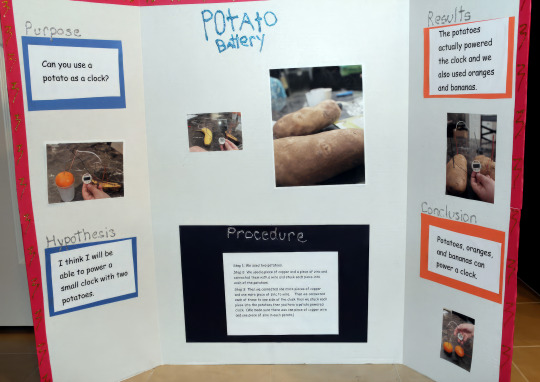
Science Fair Entry from Billy, Age 10
After a delicious feast of bratwurst, salad, and non-electrified potatoes, I convinced my aunt and uncle to sit for a sunset photoshoot. They even helped me set up my science fair project.
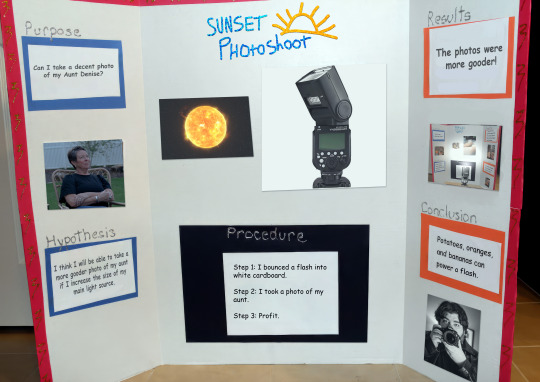
Science Fair Entry from Froggie, Age 42
I decided to do a quick test indoors to make sure my plan would work. Jeff volunteered for my first experiment.
Without my contraption...

With my contraption...


I think my experiment was quite promising. But would my idea hold up outside during the sunset with constantly dimming conditions?
We moved everything to the backyard. The tri-fold poster board was a bit ornery regarding its uprightness and needed to be tamed. My Uncle Jeff used a large rock, some pillows, and a step ladder to keep the makeshift reflectors in place.
I started taking test photos without the flash to figure out the background exposure.
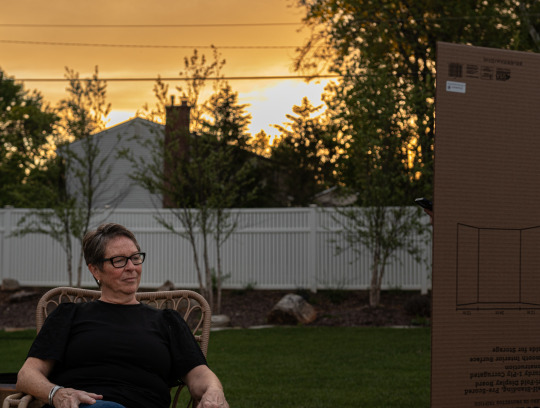
Those pesky power lines were going to need to be zapped later in Photoshop, but I was really digging the scenery.
I dialed everything in, started taking photos, and even on the little rear camera screen I felt like they were turning out well. With the sun setting the sky looked like it was on fire. But then the batteries died in my flash and I was starting to lose that fiery sky as darkness began to creep into view.
Unfortunately, all of the potatoes were in our bellies so my aunt scrambled to find regular batteries in the house.
This photoshoot had become a complete team effort with everyone doing their part to make it a success.
Surprisingly it was my Uncle Jeff was giving me some bona fide model poses. He just naturally has some sort of... resting model face. Very masculine and authentic. And my Aunt Denise is just pure sunshine manifested as a person. So I had no problems getting nice expressions from her.
So... would you like to see the pictures?
Will I get a blue ribbon on my science fair project?
Am I building up the suspense too much?
Okay, here we go...
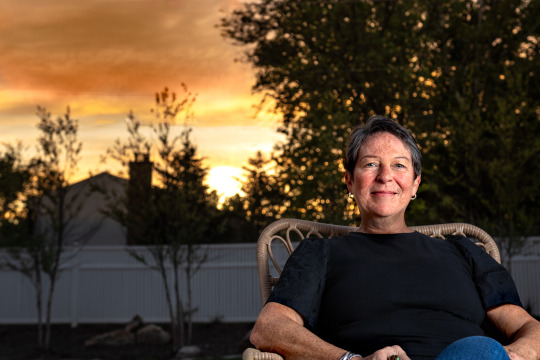



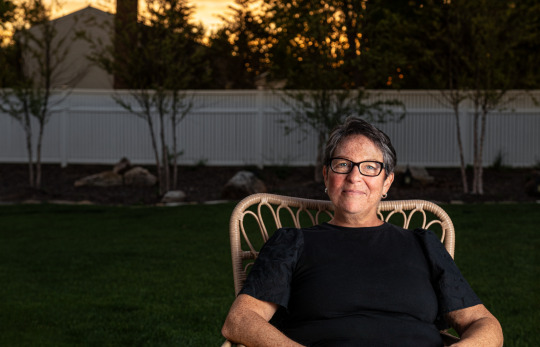



I suppose the only validation I really need is from the person who has never had a decent photo taken of them.
Let's see the verdict.
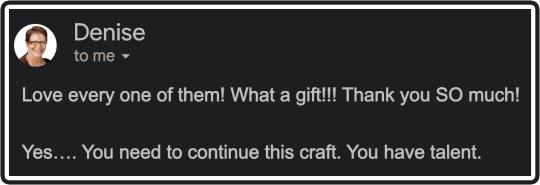
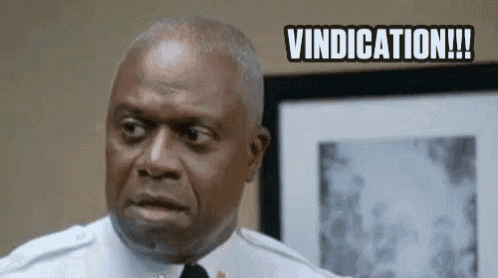
All of those hours and hours of photography training helped me learn the problem solving skills I needed to pull off a photoshoot with seven dollars in supplies.
Take a small light source, bounce it off something larger, and you get a big light source.
And big light sources make people look snazzy in photographs.
Easy!
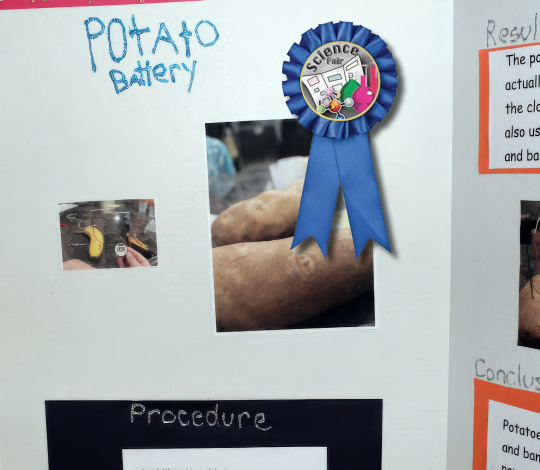
Are you kidding me?
I lost to the potato kid?
What kind of rigged nonsense...
428 notes
·
View notes
Text
All around you, businesses are suffering because they neglected the cybers. That's right. Cybersecurity is more important than ever, because Russians will send you an email attachment that you open, and then your whole network gets all fucked up. And the experts are run off their feet trying to clean all this mess up. In fact, they're so busy, that I decided to step into the breach and help them out a little.
First, some background: yes, before I went "freelance" by way of living a cash-heavy, odd-jobs, hand-to-mouth, criminal-record squatter lifestyle, I too had a regular office job. Perhaps you have one like it. Let me give you some keywords and you let me know if they trigger any deep-seated trauma: Microsoft Excel. Microsoft PowerPoint. Microsoft Project. Now that we've established our mutual bona fides, it's time for your employer to become my employer: by hiring me to clean up the next time that Bob Dipshit, CFO, decides he's going to double-click the wrong icon and hoses the entire Eastern Seaboard.
Do I have expertise in this kind of thing? No. Will I get your files back intact? Probably not. Will anyone else get your files back? About the same chance, if I'm honest. At least this way, we both – that's right, we're partners now – get to rack up some billable hours while we "study the problem" and "look for vulnerabilities" in the meantime. And you never know. Maybe once we send a photo of the car I used to get here, the Russians will realize you don't actually have any money and turn the whole thing off. Rust scares them, you see. Their cars are all made out of exotic compressed resins that goats occasionally eat if you park in the wrong place.
So the next time your office gets all screwed up, don't waste time calling the pros. Waste time calling a complete amateur, and together we can loot the company of a bunch of money before they resign themselves to having to restore from a backup. My rates are entirely reasonable, unless you're the one paying them.
191 notes
·
View notes
Text
Couch surfer in his 30s. Oscar winner in his 40s. Why the whole world wants Taika
**Notes: This is very long post!**
Good Weekend
In his 30s, he was sleeping on couches. By his 40s, he’d directed a Kiwi classic, taken a Marvel movie to billion-dollar success, and won an Oscar. Meet Taika Waititi, king of the oddball – and one of New Zealand’s most original creative exports.
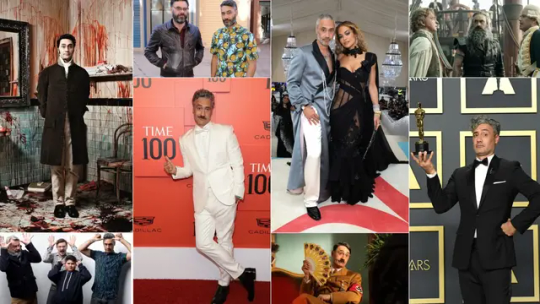
Taika Waititi: “Be a nice person and live a good life. And just don’t be an arsehole.”
The good news? Taika Waititi is still alive. I wasn’t sure. The screen we were speaking through jolted savagely a few minutes ago, with a cacophonous bang and a confused yelp, then radio silence. Now the Kiwi filmmaker is back, grinning like a loon: “I just broke the f---ing table, bro!”
Come again? “I just smashed this f---ing table and glass flew everywhere. It’s one of those old annoying colonial tables. It goes like this – see that?” Waititi says, holding up a folding furniture leg. “I hit the mechanism and it wasn’t locked. Anyway …”
I’m glad he’s fine. The stuff he’s been saying from his London hotel room could incur biblical wrath. We’re talking about his latest project, Next Goal Wins, a movie about the American Samoa soccer team’s quest to score a solitary goal, 10 years after suffering the worst loss in the game’s international history – a 31-0 ignominy to Australia – but our chat strays into spirituality, then faith, then religion.
“I don’t personally believe in a big guy sitting on a cloud judging everyone, but that’s just me,” Waititi says, deadpan. “Because I’m a grown-up.”
This is the way his interview answers often unfold. Waititi addresses your topic – dogma turns good people bad, he says, yet belief itself is worth lauding – but bookends every response with a conspiratorial nudge, wink, joke or poke. “Regardless of whether it’s some guy living on a cloud, or some other deity that you’ve made up – and they’re all made up – the message across the board is the same, and it’s important: Be a nice person, and live a good life. And just don’t be an arsehole!”
Not being an arsehole seems to have served Waititi, 48, well. Once a national treasure and indie darling (through the quirky tenderness of his breakout New Zealand films Boy in 2010 and Hunt for the Wilderpeople in 2016), Waititi then became a star of both the global box office (through his 2017 entry into the Marvel Universe, Thor: Ragnarok, which grossed more than $1.3 billion worldwide) and then the Academy Awards (winning the 2020 best adapted screenplay Oscar for his subversive Holocaust dramedy JoJo Rabbit, in which he played an imaginary Hitler).
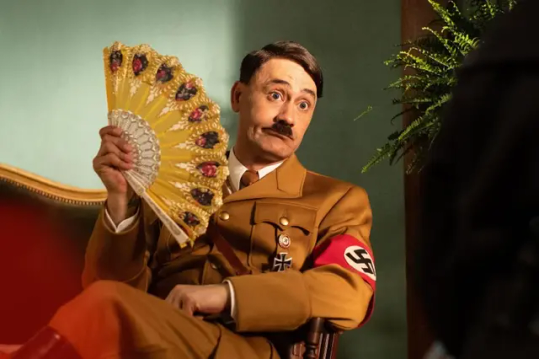
Waititi playing Adolf Hitler in the 2019 movie JoJo Rabbit. (Alamy)
A handsome devil with undeniable roguish charm, Waititi also slid seamlessly into style-icon status (attending this year’s Met Gala shirtless, in a floor-length gunmetal-grey Atelier Prabal Gurung wrap coat, with pendulous pearl necklaces), as well as becoming his own brand (releasing an eponymous line of canned coffee drinks) and bona fide Hollywood A-lister (he was introduced to his second wife, British singer Rita Ora, by actor Robert Pattinson at a barbecue).
Putting that platform to use, Waititi is an Indigenous pioneer and mentor, too, co-creating the critically acclaimed TV series Reservation Dogs, while co-founding the Piki Films production company, committed to promoting the next generation of storytellers – a mission that might sound all weighty and worthy, yet Waititi’s new wave of First Nations work is never earnest, always mixing hurt with heart and howling humour.
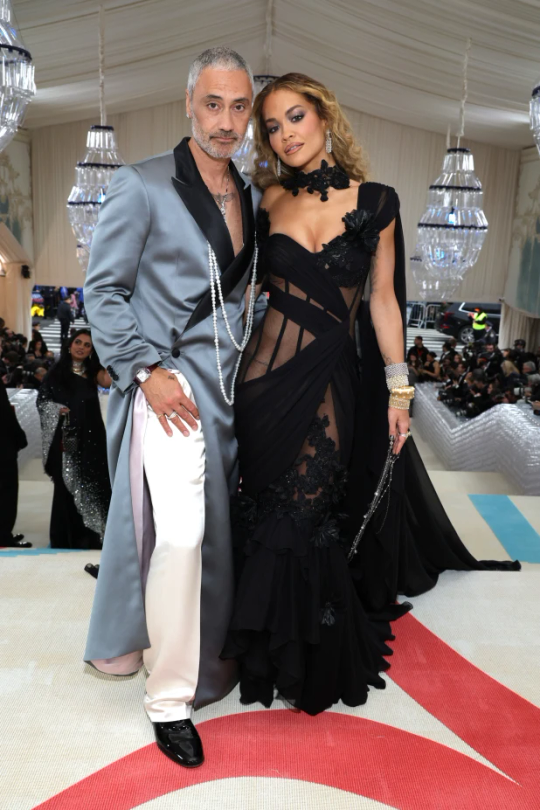
Waititi with wife Rita Ora at the 2023 Met Gala in May. (Getty Images)
Makes sense. Waititi is a byproduct of “the weirdest coupling ever” – his late Maori father from the Te Whanau-a-Apanui tribe was an artist, farmer and “Satan’s Slaves” bikie gang founder, while his Wellington schoolteacher mum descended from Russian Jews, although he’s not devout about her faith. (“No, I don’t practise,” he confirms. “I’m just good at everything, straight away.”)
He’s remained loyally tethered to his origin story, too – and to a cadre of creative Kiwi mates, including actors Jemaine Clement and Rhys Darby – never forgetting that not long before the actor/writer/producer/director was an industry maven, he was a penniless painter/photographer/ musician/comedian.
With no set title and no fixed address, he’s seemingly happy to be everything, everywhere (to everyone) all at once. “‘The universe’ is bandied around a lot these days, but I do believe in the kind of connective tissue of the universe, and the energy that – scientifically – we are made up of a bunch of atoms that are bouncing around off each other, and some of the atoms are just squished together a bit tighter than others,” he says, smiling. “We’re all made of the same stardust, and that’s pretty special.”
-----------------------------------------------
We’ve caught Waititi in a somewhat relaxed moment, right before the screen actors’ and media artists’ strike ends. He’s sensitive to the struggle but doesn’t deny enjoying the break. “I spent a lot of time thinking about writing, and not writing, and having a nice holiday,” he tells Good Weekend. “Honestly, it was a good chance just to recombobulate.”
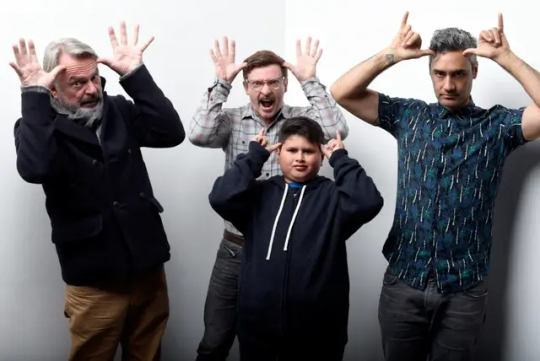
Waititi, at right, with Hunt for the Wilderpeople actors, from left, Sam Neill, Rhys Darby and Julian Dennison. (Getty Images)
It’s mid-October, and he’s just headed to Paris to watch his beloved All Blacks in the Rugby World Cup. He’s deeply obsessed with the game, and sport in general. “Humans spend all of our time knowing what’s going to happen with our day. There’s no surprises any more. We’ve become quite stagnant. And I think that’s why people love sport, because of the air of unpredictability,” he says. “It’s the last great arena entertainment.”
The main filmic touchstone for Next Goal Wins (which premieres in Australian cinemas on New Year’s Day) would be Cool Runnings (1993), the unlikely true story of a Jamaican bobsled team, but Waititi also draws from genre classics such as Any Given Sunday and Rocky, sampling trusted tropes like the musical training montage. (His best one is set to Everybody Wants to Rule the World by Tears for Fears.)
Filming in Hawaii was an uplifting experience for the self-described Polynesian Jew. “It wasn’t about death, or people being cruel to each other. Thematically, it was this simple idea, of getting a small win, and winning the game wasn’t even their goal – their goal was to get a goal,” he says. “It was a really sweet backbone.”
Waititi understands this because, growing up, he was as much an athlete as a nerd, fooling around with softball and soccer before discovering rugby league, then union. “There’s something about doing exercise when you don’t know you’re doing exercise,” he enthuses. “It’s all about the fun of throwing a ball around and trying to achieve something together.” (Whenever Waititi is in Auckland he joins his mates in a long-running weekend game of touch rugby. “And then throughout the week I work out every day. Obviously. I mean, look at me.”)
Auckland is where his kids live, too, so he spends as much time there as possible. Waititi met his first wife, producer Chelsea Winstanley, on the set of Boy in 2010, and they had two daughters, Matewa Kiritapu, 8, and his firstborn, Te Kainga O’Te Hinekahu, 11. (The latter is a derivative of his grandmother’s name, but he jokes with American friends that it means “Resurrection of Tupac” or “Mazda RX7″) Waititi and Winstanley split in about 2018, and he married the pop star Ora in 2022.
He offers a novel method for balancing work with parenthood … “Look, you just abandon them, and know that the experience will make them harder individuals later on in life. And it’s their problem,” he says. “I’m going to give them all of the things that they need, and I’m going to leave behind a decent bank account for their therapy, and they will be just like me, and the cycle will continue.”
Jokes aside – I think he’s joking – school holidays are always his, and he brings the girls onto the set of every movie he makes. “They know enough not to get in the way or touch anything that looks like it could kill you, and they know to be respectful and quiet when they need to. But they’re just very comfortable around filmmakers, which I’m really happy about, because eventually I hope they will get into the industry. One more year,” he laughs, “then they can leave school and come work for Dad.”
Theirs is certainly a different childhood than his. Growing up, he was a product of two worlds. His given names, for instance, were based on his appearance at birth: “Taika David” if he looked Maori (after his Maori grandfather) and “David Taika” if he looked Pakeha (after his white grandfather). His parents split when he was five, so he bounced between his dad’s place in Waihau Bay, where he went by the surname Waititi, and his mum, eight hours drive away in Wellington, where he went by Cohen (the last name on his birth certificate and passport).
Waititi was precocious, even charismatic. His mother Robin once told Radio New Zealand that people always wanted to know him, even as an infant: “I’d be on a bus with him, and he was that kind of baby who smiled at people, and next thing you know they’re saying, ‘Can I hold your baby?’ He’s always been a charmer to the public eye.”
He describes himself as a cool, sporty, good-looking nerd, raised on whatever pop culture screened on the two TV channels New Zealand offered in the early 1980s, from M*A*S*H and Taxi to Eddie Murphy and Michael Jackson. He was well-read, too. When punished by his mum, he would likely be forced to analyse a set of William Blake poems.
He puts on a whimpering voice to describe their finances – “We didn’t have much monneeey” – explaining how his mum spent her days in the classroom but also worked in pubs, where he would sit sipping a raspberry lemonade, doodling drawings and writing stories. She took in ironing and cleaned houses; he would help out, learning valuable lessons he imparts to his kids. “And to random people who come to my house,” he says. “I’ll say, ‘Here’s a novel idea, wash this dish,’ but people don’t know how to do anything these days.”
“Every single character I’ve ever written has been based on someone I’ve known or met or a story I’ve stolen from someone.” - Taika Waititi
He loved entertaining others, clearly, but also himself, recording little improvised radio plays on a tape deck – his own offbeat versions of ET and Indiana Jones and Star Wars. “Great free stuff where you don’t have any idea what the story is as you’re doing it,” he says. “You’re just sort of making it up and enjoying the freedom of playing god in this world where you can make people and characters do whatever you want.”
His other sphere of influence lay in Raukokore, the tiny town where his father lived. Although Boy is not autobiographical, it’s deeply personal insofar as it’s filmed in the house where he grew up, and where he lived a life similar to that portrayed in the story, surrounded by his recurring archetypes: warm grandmothers and worldly kids; staunch, stoic mums; and silly, stunted men. “Every single character I’ve ever written has been based on someone I’ve known or met,” he says, “or a story I’ve stolen from someone.”
He grew to love drawing and painting, obsessed early on with reproducing the Sistine Chapel. During a 2011 TED Talk on creativity, Waititi describes his odd subject matter, from swastikas and fawns to a picture of an old lady going for a walk … upon a sword … with Robocop. “My father was an outsider artist, even though he wouldn’t know what that meant,” Waititi told the audience in Doha. “I love the naive. I love people who can see things through an innocent viewpoint. It’s inspiring.”
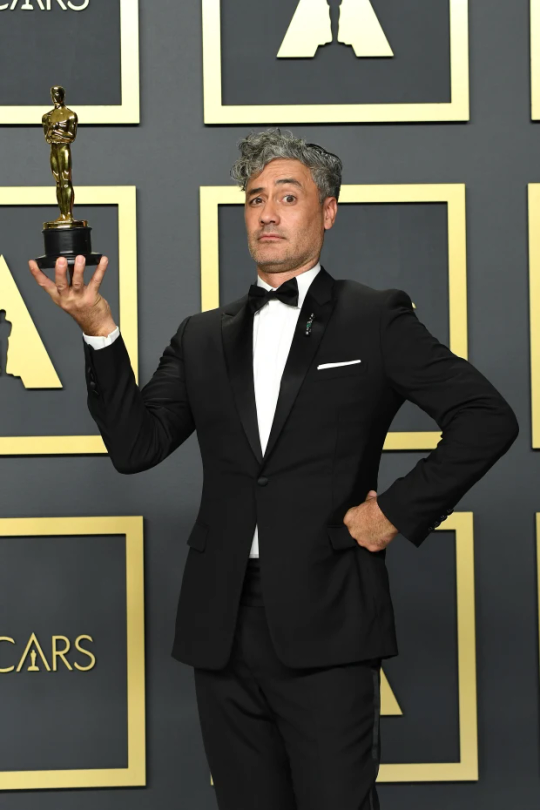
After winning Best Adapted Screenplay Academy Award for JoJo Rabbit in 2020. (Getty Images)
It was an interesting time in New Zealand, too – a coming-of-age decade in which the Maori were rediscovering their culture. His area was poor, “but only financially,” he says. “It’s very rich in terms of the people and the culture.” He learned kapa haka – the songs, dances and chants performed by competing tribes at cultural events, or to honour people at funerals and graduations – weddings, parties, anything. “Man, any excuse,” he explains. “A big part of doing them is to uplift your spirits.”
Photography was a passion, so I ask what he shot. “Just my penis. I sent them to people, but we didn’t have phones, so I would print them out, post them. One of the first dick pics,” he says. Actually, his lens was trained on regular people. He watches us still – in airports, restaurants. “Other times late at night, from a tree. Whatever it takes to get the story. You know that.”
He went to the Wellington state school Onslow College and did plays like Androcles and the Lion, A Midsummer Night’s Dream and The Crucible. His crew of arty students eventually ended up on stage at Bats Theatre in the city, where they would perform haphazard comedy shows for years.
“Taika was always rebellious and wild in his comedy, which I loved,” says his high school mate Jackie van Beek, who became a longtime collaborator, including working with Waititi on a Tourism New Zealand campaign this year. “I remember he went through a phase of turning up in bars around town wearing wigs, and you’d try and sit down and have a drink with him but he’d be doing some weird character that would invariably turn up in some show down the track.”
He met more like-minded peers at Victoria University, including Jemaine Clement (who’d later become co-creator of Flight of the Conchords). During a 2019 chat with actor Elijah Wood, Waititi describes he and Clement clocking one another from opposite sides of the library one day: a pair of Maoris experiencing hate at first sight, based on a mutual suspicion of cultural appropriation. (Clement was wearing a traditional tapa cloth Samoan shirt, and Waititi was like: “This motherf---er’s not Samoan.” Meanwhile, Waititi was wearing a Rastafarian beanie, and Clement was like, “This motherf---er’s not Jamaican.”)
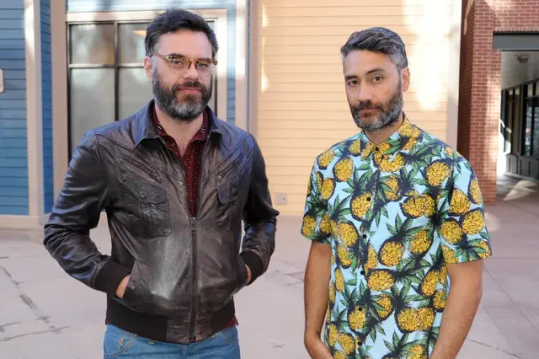
With Jemaine Clement in 2014. (Getty Images)
But they eventually bonded over Blackadder and Fawlty Towers, and especially Kenny Everett, and did comedy shows together everywhere from Edinburgh to Melbourne. Waititi was almost itinerant, spending months at a time busking, or living in a commune in Berlin. He acted in a few small films, and then – while playing a stripper on a bad TV show – realised he wanted to try life behind the camera. “I became tired of being told what to do and ordered around,” he told Wellington’s Dominion Post in 2004. “I remember sitting around in the green room in my G-string thinking, ‘Why am I doing this? Just helping someone else to realise their dream.’ ”
He did two strong short films, then directed his first feature – Eagle vs Shark (2007) – when he was 32. He brought his mates along (Clement, starring with Waititi’s then-girlfriend Loren Horsley), setting something of a pattern in his career: hiring friends instead of constantly navigating new working relationships. “If you look at things I’m doing,” he tells me, “there’s always a few common denominators.”
Sam Neill says Waititi is the exemplar of a new New Zealand humour. “The basis of it is this: we’re just a little bit crap at things.”
This gang of collaborators shares a common Kiwi vibe, too, which his longtime friend, actor Rhys Darby, once coined “the comedy of the mundane”. Their new TV show, Our Flag Means Death, for example, leans heavily into the mundanity of pirate life – what happens on those long days at sea when the crew aren’t unsheathing swords from scabbards or burying treasure.
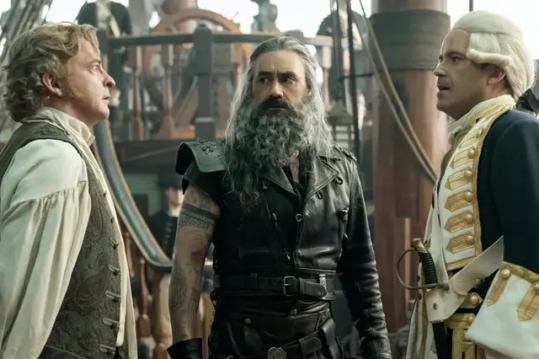
Waititi plays pirate captain Blackbeard, centre, in Our Flag Means Death, with Rhys Darby, left, and Rory Kinnear. (Google Images)
Sam Neill, who first met Waititi when starring in Hunt for the Wilderpeople, says Waititi is the exemplar of a new New Zealand humour. “And I think the basis of it is this,” says Neill. “We’re just a little bit crap at things, and that in itself is funny.” After all, Neill asks, what is What We Do in The Shadows (2014) if not a film (then later a TV show) about a bunch of vampires who are pretty crap at being vampires, living in a pretty crappy house, not quite getting busted by crappy local cops? “New Zealand often gets named as the least corrupt country in the world, and I think it’s just that we would be pretty crap at being corrupt,” Neill says. “We don’t have the capacity for it.”
Waititi’s whimsy also spurns the dominant on-screen oeuvre of his homeland – the so-called “cinema of unease” exemplified by the brutality of Once Were Warriors (1994) and the emotional peril of The Piano (1993). Waititi still explores pathos and pain, but through laughter and weirdness. “Taika feels to me like an antidote to that dark aspect, and a gift somehow,” Neill says. “And I’m grateful for that.”
-----------------------------------------------
Something happened to Taika Waititi when he was about 11 – something he doesn’t go into with Good Weekend, but which he considered a betrayal by the adults in his life. He mentioned it only recently – not the moment itself, but the lesson he learnt: “That you cannot and must not rely on grown-ups to help you – you’re basically in the world alone, and you’re gonna die alone, and you’ve just gotta make it all for yourself,” he told Irish podcast host James Brown. “I basically never forgave people in positions of responsibility.”
What does that mean in his work? First, his finest films tend to reflect the clarity of mind possessed by children, and the unseen worlds they create – fantasies conjured up as a way to understand or overcome. (His mum once summed up the main message of Boy: “The unconditional love you get from your children, and how many of us waste that, and don’t know what we’ve got.”)
Second, he’s suited to movie-making – “Russian roulette with art” – because he’s drawn to disruptive force and chaos. And that in turn produces creative defiance: allowing him to reinvigorate the Marvel Universe by making superheroes fallible, or tell a Holocaust story by making fun of Hitler. “Whenever I have to deal with someone who’s a boss, or in charge, I challenge them,” he told Brown, “and I really do take whatever they say with a pinch of salt.”
It’s no surprise then that Waititi was comfortable leaping from independent films to the vast complexity of Hollywood blockbusters. He loves the challenge of coordinating a thousand interlocking parts, requiring an army of experts in vocations as diverse as construction, sound, art, performance and logistics. “I delegate a lot,” he says, “and share the load with a lot of people.”
“This is a cool concept, being able to afford whatever I want, as opposed to sleeping on couches until I was 35.” - Taika Waititi
But the buck stops with him. Time magazine named Waititi one of its Most Influential 100 People of 2022. “You can tell that a film was made by Taika Waititi the same way you can tell a piece was painted by Picasso,” wrote Sacha Baron Cohen. Compassionate but comic. Satirical but watchable. Rockstar but auteur. “Actually, sorry, but this guy’s really starting to piss me off,” Cohen concluded. “Can someone else write this piece?”
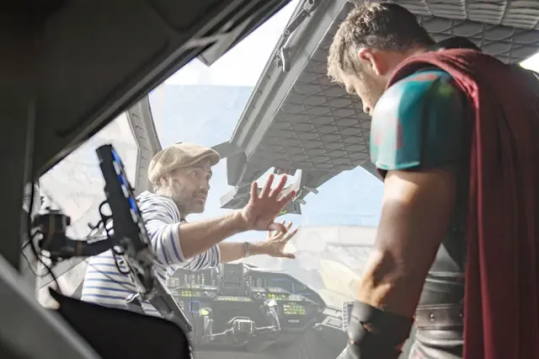
Directing Chris Hemsworth in 2017 in Thor: Ragnarok, which grossed more than $1.3 billion at the box office. (Alamy)
I’m curious to know how he stays grounded amid such adulation. Coming into the game late, he says, helped immensely. After all, Waititi was 40 by the time he left New Zealand to do Thor: Ragnarok. “If you let things go to your head, then it means you’ve struggled to find out who you are,” he says. “But I’ve always felt very comfortable with who I am.” Hollywood access and acclaim – and the pay cheques – don’t erase memories of poverty, either. “It’s more like, ‘Oh, this is a cool concept, being able to afford whatever I want, as opposed to sleeping on couches until I was 35.’ ” Small towns and strong tribes keep him in check, too. “You know you can’t piss around and be a fool, because you’re going to embarrass your family,” he says. “Hasn’t stopped me, though.”
Sam Neill says there was never any doubt Waititi would be able to steer a major movie with energy and imagination. “It’s no accident that the whole world wants Taika,” he says. “But his seductiveness comes with its own dangers. You can spread yourself a bit thin. The temptation will be to do more, more, more. That’ll be interesting to watch.”
Indeed, I find myself vicariously stressed out over the list of potential projects in Waititi’s future. A Roald Dahl animated series for Netflix. An Apple TV show based on the 1981 film Time Bandits. A sequel to What We Do In The Shadows. A reboot of Flash Gordon. A gonzo horror comedy, The Auteur, starring Jude Law. Adapting a cult graphic novel, The Incal, as a feature. A streaming series based on the novel Interior Chinatown. A film based on a Kazuo Ishiguro bestseller. Plus bringing to life the wildly popular Akira comic books. Oh, and for good measure, a new instalment of Star Wars, which he’s already warned the world will be … different.
“It’s going to change things,” he told Good Morning America. “It’s going to change what you guys know and expect.”
Did I say I was stressed for Waititi? I meant physically sick.
“Well…” he qualifies, “some of those things I’m just producing, so I come up with an idea or someone comes to me with an idea, and I shape how ‘it’s this kind of show’ and ‘here’s how we can get it made.’ It’s easier for me to have a part in those things and feel like I’ve had a meaningful role in the creative process, but also not having to do what I’ve always done, which is trying to control everything.”
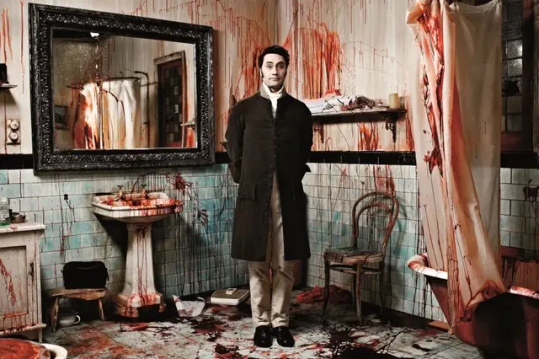
In the 2014 mockumentary horror film What We Do in the Shadows, which he co-directed with Jemaine Clement. (Alamy)
What about moving away from the niche New Zealand settings he represented so well in his early work? How does he stay connected to his roots? “I think you just need to know where you’re from,” he says, “and just don’t forget that.”
They certainly haven’t forgotten him.
Jasmin McSweeney sits in her office at the New Zealand Film Commission in Wellington, surrounded by promotional posters Waititi signed for her two decades ago, when she was tasked with promoting his nascent talent. Now the organisation’s marketing chief, she talks to me after visiting the heart of thriving “Wellywood”, overseeing the traditional karakia prayer on the set of a new movie starring Geoffrey Rush.
Waititi isn’t the first great Kiwi filmmaker – dual Oscar-winner Jane Campion and blockbuster king Peter Jackson come to mind – yet his particular ascendance, she says, has spurred unparalleled enthusiasm. “Taika gave everyone here confidence. He always says, ‘Don’t sit around waiting for people to say, you can do this.’ Just do it, because he just did it. That’s the Taika effect.”
-----------------------------------------------
Taika David Waititi is known for wearing everything from technicolour dreamcoats to pineapple print rompers, and today he’s wearing a roomy teal and white Isabel Marant jumper. The mohair garment has the same wispy frizz as his hair, which curls like a wave of grey steel wool, and connects with a shorn salty beard.
A stylish silver fox, it wouldn’t surprise anyone if he suddenly announced he was launching a fashion label. He’s definitely a commercial animal, to the point of directing television commercials for Coke and Amazon, along with a fabulous 2023 spot for Belvedere vodka starring Daniel Craig. He also joined forces with a beverage company in Finland (where “taika” means “magic”) to release his coffee drinks. Announcing the partnership on social media, he flagged that he would be doing more of this kind of stuff, too (“Soz not soz”).
Waititi has long been sick of reverent portrayals of Indigenous people talking to spirits.
There’s substance behind the swank. Fashion is a creative outlet but he’s also bought sewing machines in the past with the intention of designing and making clothes, and comes from a family of tailors. “I learnt how to sew a button on when I was very young,” he says. “I learnt how to fix holes or patches in your clothes, and darn things.”
And while he gallivants around the globe watching Wimbledon or modelling for Hermès at New York Fashion Week, all that glamour belies a depth of purpose, particularly when it comes to Indigenous representation.
There’s a moment in his new movie where a Samoan player realises that their Dutch coach, played by Michael Fassbender, is emotionally struggling, and he offers a lament for white people: “They need us.” I can’t help but think Waititi meant something more by that line – maybe that First Nations people have wisdom to offer if others will just listen?
“Weeelllll, a little bit …” he says – but from his intonation, and what he says next, I’m dead wrong. Waititi has long been sick of reverent portrayals of Indigenous people talking to kehua (spirits), or riding a ghost waka (phantom canoe), or playing a flute on a mountain. “Always the boring characters,” he says. “They’ve got no real contemporary relationship with the world, because they’re always living in the past in their spiritual ways.”

A scene from Next Goal Wins, filmed earlier this year. (Alamy)
He’s part of a vanguard consciously poking fun at those stereotypes. Another is the Navajo writer and director Billy Luther, who met Waititi at Sundance Film Festival back in 2003, along with Reservation Dogs co-creator Sterlin Harjo. “We were this group of outsiders trying to make films, when nobody was really biting,” says Luther. “It was a different time. The really cool thing about it now is we’re all working. We persevered. We didn’t give up. We slept on each other’s couches and hung out. It’s like family.”
Waititi has power now, and is known for using Indigenous interns wherever possible (“because there weren’t those opportunities when I was growing up”), making important introductions, offering feedback on scripts, and lending his name to projects through executive producer credits, too, which he did for Luther’s new feature film, Frybread Face and Me (2023).
He called Luther back from the set of Thor: Love and Thunder (2022) to offer advice on working with child actors – “Don’t box them into the characters you’ve created,” he said, “let them naturally figure it out on their own” – but it’s definitely harder to get Waititi on the phone these days. “He’s a little bitch,” Luther says, laughing. “Nah, there’s nothing like him. He’s a genius. You just knew he was going to be something. I just knew it. He’s my brother.“
I’ve been asked to explicitly avoid political questions in this interview, probably because Waititi tends to back so many causes, from child poverty and teenage suicide to a campaign protesting offshore gas and oil exploration near his tribal lands. But it’s hard to ignore his recent Instagram post, sharing a viral video about the Voice to Parliament referendum starring Indigenous Aussie rapper Adam Briggs. After all, we speak only two days after the proposal is defeated. “Yeah, sad to say but, Australia, you really shat the bed on that one,” Waititi says, pausing. “But go see my movie!”
About that movie – the early reviews aren’t great. IndieWire called it a misfire, too wrapped in its quirks to develop its arcs, with Waititi’s directorial voice drowning out his characters, while The Guardian called it “a shoddily made and strikingly unfunny attempt to tell an interesting story in an uninteresting way”. I want to know how he moves past that kind of criticism. “For a start, I never read reviews,” he says, concerned only with the opinion of people who paid for admission, never professional appraisals. “It’s not important to me. I know I’m good at what I do.”
Criticism that Indigenous concepts weren’t sufficiently explained in Next Goal Wins gets his back up a little, though. The film’s protagonist, Jaiyah Saelua, the first transgender football player in a FIFA World Cup qualifying match, is fa’afafine – an American Samoan identifier for someone with fluid genders – but there wasn’t much exposition of this concept in the film. “That’s not my job,” Waititi says. “It’s not a movie where I have to explain every facet of Samoan culture to an audience. Our job is to retain our culture, and present a story that’s inherently Polynesian, and if you don’t like it, you can go and watch any number of those other movies out there, 99 per cent of which are terrible.”
*notes: (there is video clip in the article)
Waititi sounds momentarily cranky, but he’s mostly unflappable and hilarious. He’s the kind of guy who prefers “Correctumundo bro!” to “Yes”. When our video connection is too laggy, he plays up to it by periodically pretending to be frozen, sitting perfectly still, mouth open, his big shifting eyeballs the only giveaway.
He’s at his best on set. Saelua sat next to him in Honolulu while filming the joyous soccer sequences. “He’s so chill. He just let the actors do their thing, giving them creative freedom, barely interjecting unless it was something important. His style matches the vibe of the Pacific people. We’re a very funny people. We like to laugh. He just fit perfectly.”
People do seem to love working alongside him, citing his ability to make productions fresh and unpredictable and funny. Chris Hemsworth once said that Waititi’s favourite gag is to “forget” that his microphone is switched on, so he can go on a pantomime rant for all to hear – usually about his disastrous Australian lead actor – only to “remember” that he’s wired and the whole crew is listening.
“I wouldn’t know about that, because I don’t listen to what other people say about anything – I’ve told you this,” Waititi says. “I just try to have fun when there’s time to have fun. And when you do that, and you bring people together, they’re more willing to go the extra mile for you, and they’re more willing to believe in the thing that you’re trying to do.”
Yes, he plays music between takes, and dances out of his director’s chair, but it’s really all about relaxing amid the immense pressure and intense privilege of making movies. “Do you know how hard it is just to get anything financed or green-lit, then getting a crew, getting producers to put all the pieces together, and then making it to set?” Waititi asks. “It’s a real gift, even to be working, and I feel like I have to remind people of that: enjoy this moment.”
Source: The Age
By: Konrad Marshall (December 1, 2023)
198 notes
·
View notes
Text
by Steven Zeitchik
Those comments sparked a backlash at the time. But many liberal Jews in Hollywood, media and tech identified with her remarks.
To some non-Jews I talked to, today’s news was just a case of a tribal rooting interest not going our way. “Oh well, you’ll get the next one,” went their vibe. But when a Jewish leader this popular from a state so necessary gets passed over, it becomes more than just a matter of losing a round of identity-politics poker — it touches an existential nerve.
Some Jews have also noted that in choosing Walz, Harris was simply trying to stay away from raising Gaza as an issue. But outside of antisemitic projection, why would it do that? The idea that a candidate would automatically want to talk more about Israel simply because he’s Jewish raises ugly tropes of dual loyalty, or worse.
Wary of seeming killjoyish, some liberal Jewish Americans also sought to find a silver lining — at least now Jews wouldn’t be blamed for administration failures, they said. They cited The Atlantic’s Yair Rosenberg, one of the most eloquent expositors of the double standards applied to Shapiro, who in a recent piece expressed some reservations about what a Shapiro vice presidency would bring.
“Anti-Semitism conceives of Jews as clandestine puppeteers who control the world’s governments and economies, fueling political and social problems,” he wrote. “A Jewish vice president would provide the perfect canvas for these fevered fantasies — a largely ceremonial figure onto whom bigots could nonetheless project all of their conspiracies, casting him as the real power behind the Resolute Desk.”
Rosenberg has forgotten more about the history of antisemitism than most of us will ever know. But this train of thought has always struck me as self-defeating. The response to fears of prejudice can’t be, “Let’s hide the Jews to prevent us from finding out about it.”
A Jewish vice president would have been important not only because it would have signaled the latest progress of one ethnic group in America as thrillingly as Harris’ candidacy does for Americans of Black and Indian heritage, but also because it would have drawn antisemites out from the crevices, shining Louis Brandeis’ disinfecting light brightly upon them.
(That Harris’ husband is Jewish, incidentally, should do little to quell the unease. Jewish affiliations are proof of nothing except the reminder of past justifications. It calls to mind those who several years ago said Taika Waititi’s Nazi comedy Jojo Rabbit couldn’t be antisemitic because Waititi was Jewish. It wasn’t antisemitic. But that wasn’t the reason.)
Walz is a solid candidate with a strong record of speaking out against antisemitism. Just this spring he told Twin Cities PBS that, “I think when Jewish students are telling us they feel unsafe in that, we need to believe them.”
But Walz’s pro-Jewish bona fides don’t mean the decision to put him on the ticket — or the reaction to his appointment — can’t also be shadowed with antisemitism. Both can be true.
And so here liberal Jews again find ourselves, hopelessly marooned between a belief that Democratic policies are fundamentally better for our interests and yet worried we are not welcome in our own home — feeling a gentle nudge that perhaps we might find ourselves more comfortable in another place but unsure, in the end, of where else to go.
51 notes
·
View notes
Note
C might mean well, but I find businesses using charity to sell suspicious.
Dear Provocative Anon,
What you say deserves an audio (there have been two of them two weeks ago, compensating for last week's silence). I have many things to tell you and please excuse the delay:
They really can't win, with people like you, can they? And that goes for both C and S, mind you. No matter what they do and try to promote as a side project, there is always going to be someone unhappy and vocal about it. When it's not you complaining 'business using charity to sell' is 'suspicious', there's the other fuckwit asking recently why S hasn't given all MPC's profit to charity, as Paul Newman did with Newman's Own.
So, I will be brutally honest with you, Anon. I have thoughts and questions about your own point of view and this is partially why it took me so long to answer you. It would seem you are not familiar at all with what is called 'corporate social responsibility' (CSR), since at least the Sixties. Which means, in a nutshell, companies who choose to focus part of their activity and dedicate part of their profits to charitable projects. It is done with various degrees of ethics, success and bona fides all around the world, and it is often used as a strong marketing and sales argument.
Think about these people, whose brand is probably immediately recognizable wherever you go, spare perhaps Pyongyang:

I just picked this Coca Cola Foundation recent CSR project in Brazil totally randomly, using Google. Some might think it's just another cynical diversion: one of the world's biggest corporate profiteers, happily contributing to the current obesity pandemic (including in Latin America), suddenly showing one of its biggest markets they do have a conscience, after all, and a social one to boot. And addressing, at the same time, one of the continent's post-colonial bleeding wounds, which is to say, the organic imbalance between rich and poor, as far as access to means of production, land ownership and use and sales opportunities go. 480 farmers benefitting from Coca Cola's magnanimity is probably but a tiny drop of hope in an ocean of dour social injustice, but the truth is, Anon, if nobody does anything good, then nothing good will happen at all. It is as simple as that, and while their modus operandi is probably not exactly my cup of tea, you will have to admit it works, at least to some extent and for some people. Plus it greatly enhances the company's do-good, sensible and reliable global image, because of course, what happens right now in the state of Minas Gerais is but a tiny part of a bigger strategy.
Might I add that even those robber barons, à la Cornelius Vanderbilt or Jay Gould, who made their ruthless fortunes building the railroads of a still very young United States of America, ended up giving a very small part of their same fortune to various charities. It wasn't nearly enough what we would consider as 'reasonable', in 2024, but it did start a philanthropic trend, that took considerable speed after the 1919 Boston Molasses Disaster. The Sixties have just added more pragmatism and gave a name to what was, at its very start, quite an opportunistic endeavor.
Even so, Vanderbilt and Gould themselves did not invent anything, really. One should look to good old Europe to find what is probably the first big CSR project in human history, still going strong since 1521. May I introduce you to the Augsburg Fuggerei:


[for even more pious charity: https://www.fugger.de/en/fuggerei]
Renting one of those wonderful Hansel and Gretel houses for less than one euro/year, plus three daily Hail Mary is something to behold, right? Jakob Fugger the Young, the guy who had this brilliant idea (which, might I add, is still run and operated by the Fugger banker family, even nowadays) was literally a ruthless kingmaker, a colonial trade and exploration pioneer, but also a religious bigot who flatly refused to extend his charity to Protestant families. Still, his pious dream goes on - the Fugger Family Foundation even actively plans its next 500 years. This is Germany, after all 😉.
Those people’s money stinks more of corruption and crime than S or C’s ever could, Anon. Still, they are remembered as benefactors, by many. History is seldom cruel to those who are willing to pay for their posterity.
But you know what, Anon? Compared to the Fuggers and the Vanderbilts and the Goulds, S and C are really small fish in an even smaller, fickler pond. I think they are doing it out of their good heart and I think they are honestly, genuinely responsive to the idea of giving a chance to young, struggling artists. But, in the process, are they also trying to market themselves as more approachable and less controversial, considering the (oh, I shall never tire to repeat this, with gusto) cosmic amount of bullshit plaguing their respective public images? My somewhat cynical answer is also yes, Anon. To which may I immediately add that it's not even important: all that counts are the tangible results of whatever good things they do with their booze and/or fitness profits.
Results and helping trigger a change in one's life is all that really interests me, Anon. It seems to bother you, though, so I will cheekily end this long rant with a couple of questions: do you have a problem with poverty? do you believe in giving people a (second) chance, or do you think only the rich are worth considering and valuable?
If so, I honestly pity you, girl. For the real indigent in all this might be you.
67 notes
·
View notes
Text
Excerpt from this story from Inside Climate News:
Soon after Vice President Kamala Harris selected Tim Walz as her running mate this week, pictures of the Minnesota governor began to spread across social media—of Walz holding a piglet, of Walz on thrill rides at the state fair, of Walz and his rescue dog.
All of it coalesces into an image of a guy with rural roots and deep ties to agriculture.
Since Harris’ announcement, climate advocates have applauded her pick, pointing to Walz’s solid climate bona fides. Farm groups across the political spectrum, including those that work to shrink agriculture’s carbon footprint, have, too.
During his six terms in Congress, Walz was a member of the House Committee on Agriculture, where he was instrumental in ensuring that soil conservation measures made it into the 2018 farm bill. At the time, the farm bill—the massive piece of legislation that guides the country’s nutrition and farm policy—failed to acknowledge agriculture’s role in contributing to climate change, and barely hinted at its potential role in slowing it.
Walz, who spent his early years working on his family’s farm in rural Nebraska, found a political work-around of sorts. That year he introduced the Strengthening Our Investment in Land (SOIL) Stewardship Act, which boosted existing farm conservation programs and incentivized farms to adopt certain practices that improve soil health, ultimately making soils better able to sequester carbon.
“Even as short a time ago as 2018, the word ‘climate’ does not appear in the farm bill,” said Ferd Hoefner, who was policy director at the National Sustainable Agriculture Coalition at the time. “He made soil health, through the SOIL Act, the acceptable thing one could talk about when one was trying to talk about climate mitigation through agriculture.”
Hoefner noted that the last time the term climate change appeared in a farm bill was in 1990, an indication of just how polarized and partisan the issue has become in farm policy debates since then. After that, it “was verboten to even mention the word,” he added.
The provisions of the SOIL Stewardship Act were ultimately included in that year’s farm bill. Farm policy observers also point to one of Walz’s biggest farm-related accomplishments, which was introducing bills in 2014 and 2018 that help small-scale, veteran and beginning farmers access credit and funds for land, equipment and crop insurance. Provisions of these bills made it into the final versions of those years’ farm bills.
The Land Stewardship Project, based in Minnesota, has long pushed against the trend of increasing consolidation in agriculture, which has seen the rise of ever-larger farms, mostly run by large corporate entities. This week the council applauded Walz’s record of working against this ongoing shift.
“What we’ve seen through his time in Congress and his time in the governor’s office is that issues around the future of agriculture and rural communities aren’t partisan—they cut across political lines,” said Sean Carroll, policy director at Land Stewardship Action, the organization’s political arm. “Many bills he’s co-sponsored or led are about creating a future for rural communities where we can keep more farmers on the land, where we can allow farmers who are stewarding the land to succeed and make money.”
52 notes
·
View notes
Text
I've seen way too much of Jonathan's trip to Transylvania being called Dracula "luring" him there and like, I perfectly see where it comes from but that's explicitly not what happened. Jonathan went on a bona fide business trip as a solicitor because Dracula was buying property in England. Yeah, there's the whole "leaving you trapped in my spooky castle with my three bloodsucking girlfriends" part, but Dracula absolutely, explicitly needed an English lawyer to help him with the paperwork.
Bram Stoker pretty much created the og Monstrous Meeting Mundane. Before there was Frankenestein writing grant projects or Bond villains providing WWF approved tank for their man-eating sharks, there was Dracula confronting industrial era England property regulations.
72 notes
·
View notes
Note
That music take got me thinking about which other characters would like dad rock, and man... if I'm gonna call myself the classic rock nerdlord, I best flex a bit, so -cracks knuckles- here we go. This is gonna be a long one. I'm gonna focus on non-lords for this
Ashe. His dad was into a lot of 70s rock and it rubbed off on him. Same for Lonato, which just makes the whole genre that much more special to him. Putting on a classic rock record brings him back to happier days. There's a lot he enjoys like Eric Clapton and Journey, but a special place in his heart is reserved for Tom Petty and the Heartbreakers [and by extension, the Traveling Wilburys]. Favourite song: I Won't Back Down
Inigo/Lazward. Come on, take one look at him and tell me he's not a Beatles fan. I dare you. Guy's practically in love with John Lennon. Subsequently, he also loves John's post-Beatles work. Favourite song: Love Me Do
Frederick. I dunno, something about him screams Jackson Browne fan. He'd also be into the Eagles and Steely Dan. There is no doubt that his music taste influenced Chrom's to a substantial degree. Is that a good thing? You decide. Favourite song: Doctor, My Eyes
Rodrigue. To the surprise of absolutely nobody. What we call dad rock now used to be fresh top 40s hits to Roddy, of course he likes the shit. The first time he heard the Byrds on the radio, he fell instantly in love. He's also a big fan of the Who. Favourite song: My Back Pages [this is a Bob Dylan cover]
Takumi and Leo. This is a two-in-one and yeah I'm breaking the non-lord rule, but hear me out here. These two are bona fide metalheads, but like old school metal. I'm talking Black Sabbath old school with a huge helping of 80s thrash metal. That said, both do enjoy some typical classic rock. Takumi has a soft spot for the Eagles while Leo is a closet Fleetwood Mac fan. Favourite non-metal songs: Lyin' Eyes [Takumi] and Dreams [Leo]
Oboro. Alright, I admit I'm projecting here with this one, but I can't unsee her being a Def Leppard fan, and these days the Leps would be considered dad rock. She's also into David Bowie. Favourite song: Lady Strange [I'm trying not to project too hard here]
Griss/Gregory. Technically a two-in-one, but for all the ways they are different, their taste in music is 100% identical -- or rather, 99.99% identical. Both are huge fans of Alice Cooper, but they have different favourite songs. Favourite songs: Teenage Frankenstein [Griss] and Billion Dollar Babies [Gregory]
Leonie. This surprises a lot of people, but she's not into modern music. I dunno, she just doesn't vibe with it. Older music, however, is a different story, and it turns out she really likes Kiss and AC/DC. No one's quite sure what drew her to those bands above everyone else and she doesn't feel inclined to share. Favourite song: Black Diamond
Lewyn. He didn't have that much of an opinion on the genre before, but traveling on the road resulted in a lot of classic rock getting stuck in his head and he finds he enjoys it. The Allman Brothers Band and Electric Light Orchestra are the ones who take up the most free real estate in his head. Favourite song: Midnight Rider
Tsubaki. There's debate as to whether this is out of left field or completely expected of him. Not that he knows this debate is even happening because nobody wants to get involved in that discussion with him. Like Lazward, he also enjoys the Beatles' post-breakup work, but while Lazward loves John Lennon, Tsubaki leans more towards Paul McCartney, especially the Wings years. Favourite song: Nineteen Hundred and Eighty-Five
Xane. One might think he wouldn't care for music, but no, he actually likes music. His taste in music is quite varied and isn't limited to classic rock, and of the classic rock he's heard, honestly he wouldn't be able to pick a favourite group out of anyone. He just likes it all. It's really interesting. Favourite classic rock song if he had to pick one: Bad Moon Rising - Creedence Clearwater Revival
I'll be here all day if I keep listing out more so I'm gonna stop there
.
12 notes
·
View notes
Text
For the last two weeks or so I've been playing the Mega Drive dungeon crawler Shining in the Darkness. I've recently been going through all the various action-RPGs the system had to offer and kinda found myself lusting for more, so I expanded the scope.
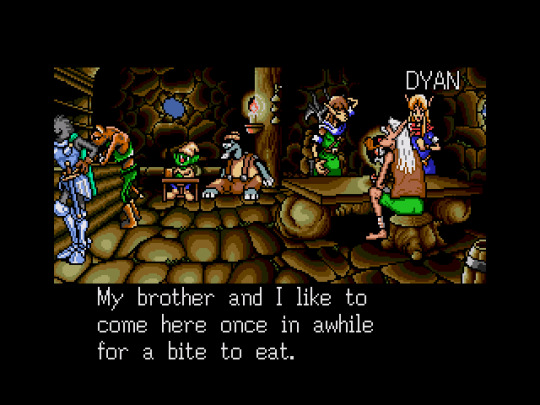
Shining in the Darkness had one of those cover arts I vividly remember seeing in game stores during the 90s, I understood already back then that whatever this was would be too complicated for my feeble preschool brain, but it had a shiny glossy allure that still beckoned to me with promises of daring adventures and grand battles. Questions lingered in my head: Who is that evil bastard zapping sparks at Cavin from the Gummi Bears? Why has the king entrusted the safety of his kingdom to a meagre boy and his two misfit friends?
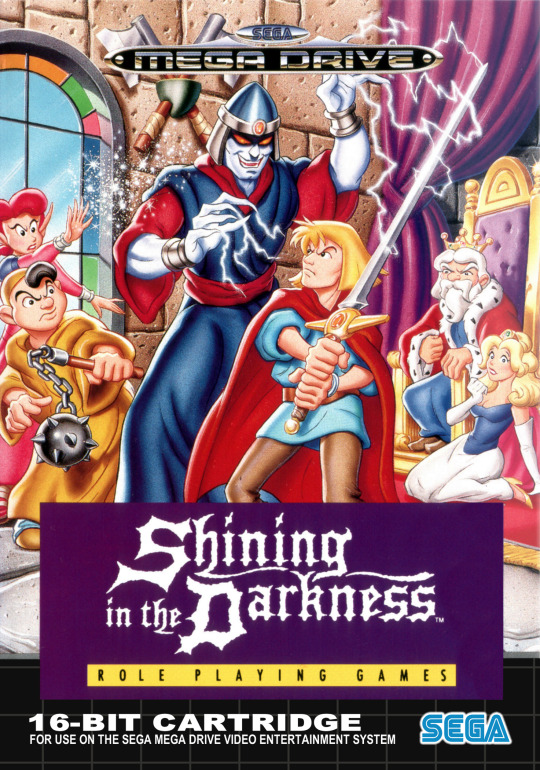
Well, it turns out that big bad guy is called Dark Sol, the bane of all game difficulty discourse, and the reason the king has enlisted three poor kids is because there is no one else to rely on after your daddy went missing. Everyone else just sorta gives up along the way.
My initial conclusion of this game was to commend my young self for the striking assessment, my five year old self would never get anywhere in this game between the English text, abstracted navigation and number crunching battle mechanics. Shining in the Darkness is a bona fide classic dungeon gauntlet endurance simulator, where you traverse vanishing point block tunnels and encounter enemies. I've played one or two games like this before, like the original Phantasy Star, but this time a new desire struck me. I wanted to draw maps. Maybe I'm just getting older and more patient, leading me to wilfully ignore easily available resources online.
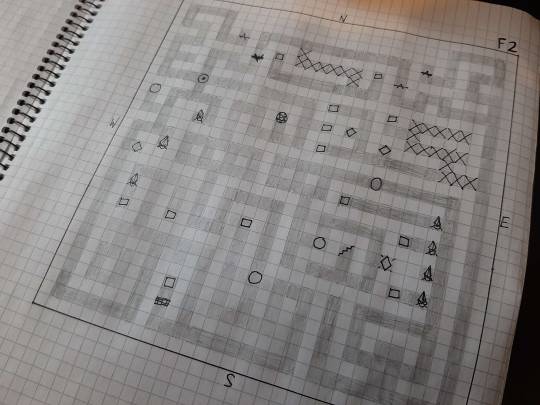
By my recollection, this is the first time I've dedicated myself to playing a game like this. Usually I just resort to my sense of direction, which I've gathered seems to at least be above average, since anytime I go anywhere with anyone I always end up playing shepherd so they don't get lost. Worst case scenario I'll just fall back to mapping efforts by online heroes from years past. For Shining in the Darkness I persisted blindly about halfway through until I admitted to myself charting a map of the labyrinthine caves would be a lot easier. Luckily, the game allows you to spend 1 MP to see a chunk of where you've walked, meaning I could get neatly organized segments to copy by hand.
Perhaps my biggest takeaway from this endeavour was how much of the game experience was expressed through this map project. I spent just as much time slaying beasts as I did counting tiles and filling them out with my pencil. It became a natural counterbalance that provided vital pacing to the game mechanics. Walking, fighting, charting. In turn, through the principle of learning by doing, I gained a more intimate familiarity with the environments by just replicating them out on a sheet of paper. I found that while the map helped, I actually didn't need it much for backtracking because my drawings had helped me remember the layouts of the corridors anyway.
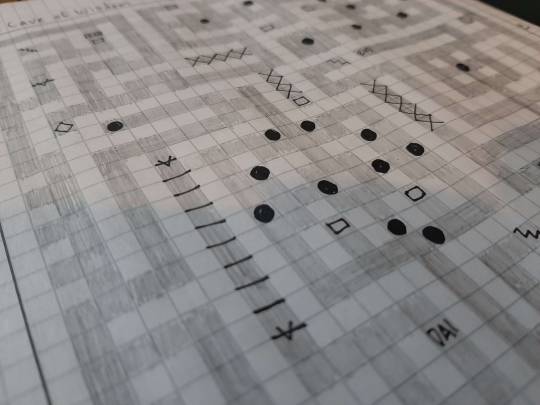
I guess the lesson learned is that while old design sensibilities may appear to be arcane and cumbersome when easier solutions exists, the obfuscation is part of the fun. The game hands me an intentionally hard to navigate world, shows me that it's fully capable of displaying maps of it, but still asks me to provide that dimension myself. Through doing this, I discover that drawing maps is both surprisingly enjoyable and cognitively stimulating. I realize that had I downloaded some pre-packaged maps online and used as my bible, Shining in the Darkness would've been a vastly different experience, one of monotonous meandering through endless fights while confidently striding along the known path.
Perhaps that's why the game was called Shining and the Darkness in Japan, it doesn't flow as well as the western title, but at the same time it poetically reflects this act of discovery. I am Shining, the game provides the Darkness, we work together, we must unify to become whole.
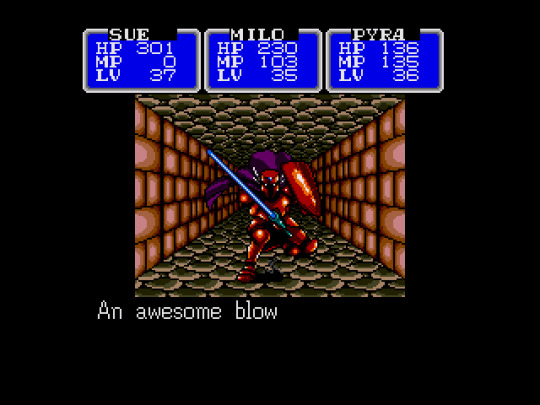
As for Dark Sol, he turned into a big monster boy and was vanquished by a spunky cartographer child and her two cohorts. The unknown has been made known and the kingdom is once more saved.
/Kiki
65 notes
·
View notes
Text
What if I told you that a little project called Chuuya the Vampire Slayer has taken root in my brain and in my google docs…
“What do you want?” Chuuya asks, already irritated by Dazai’s presence.
“I’m hungry,” Dazai says, sulkily but with an edge to it.
That makes Chuuya pause.
He wonders if Dazai truly appreciates the gravity of this situation. He thinks he does, or at least understands it, if not appreciates it, despite his tone teetering toward a childish whine.
But Chuuya will do his damndest to not let Dazai see it affect him.
He’s not scared—far from it—but there’s anxiety prickling under his skin at the plain fact that he’s willingly doing this.
He’d like to say it won’t change anything, but his intuition tells him this will be one of those moments that slices his life into a before and an after.
In the past, a few lucky vamps managed to get bites in before he slayed them, but they never got further than a mere sip of his blood. Those vampires were far older, more experienced, and had attacked him with bona fide minions to get past his defenses.
He hated giving them even the briefest satisfaction of tasting his blood.
And now…
Dazai approaches, close enough to force Chuuya to look up at him.
This won’t do.
With a hand on his chest, Chuuya roughly pushes him away.
“Not the neck,” he says, firm and leaving no room for protest.
Dazai protests anyway.
“Ah, but it looks so tempting and delicious~!”
“It’s a fucking neck,” Chuuya mumbles as he gets his keys back out and unlocks the bookstore’s back door.
He doesn’t turn on any of the lights and resolutely ignores the pounding of his heart as he makes his way to an armchair in the central reading area.
It’s eerily quiet without the sound of Dazai’s breath. Chuuya can sense him there, but it is an undeniably inhuman presence that’s following him.
His instincts itch to lash out, to take out the threat, but he takes a deep breath to soothe the feeling of wrongness this whole affair instills in him.
He removes his jacket and drapes it over the back of the chair before taking a seat.
“Knees,” he says, bluntly, gesturing to the floor before him.
Dazai’s brow quirks, that playful smile dancing at the corner of his lips. His eyes grow brighter as he sinks to his knees before Chuuya.
“Aren’t you afraid that I can’t control myself?” Dazai taunts.
Chuuya scoffs. “No.”
A pout. “Why not?”
Chuuya smirks. “I can control you.”
Dazai’s eyes are glowing red now, though they lack the madness from his bloodlust.
Chuuya extends his left forearm toward Dazai and spreads his legs wide to let him shuffle closer.
“I’ll kill you if you try to take too much,” Chuuya says, leveling his gaze with Dazai’s. He casually holds a stake in his right hand and leans his elbow on his knee, bringing their faces closer together. “You get that, yeah?”
19 notes
·
View notes
Text
Isaac here, with another recommendation response masterpost! It's a long one!
Anon said:
oh my godyou guys HAVE to cover metal from heaven by august clarke as the next thing to add to the list i just saw the reviews and it literally looks like main wizlez for the first time in quite a while
We actually have had an ARC of this one for some time, and we were intending to cover it! And I bounced off it real hard. So that's on me. Once it comes out properly and there's an audiobook I'll take another crack at it.
Seiya said:
“A Sweet Sting of Salt” by Rose Sutherland is for all the girlies who read Charity and Sylvia and wanted more of that. or, 19th century Nova Scotia selkie lesbians. the wizard is less a wizard and more a condemnation of the selkie folktale in general, but also the vibes are nice and this was a nice book
We're going to need a vibes are nice book - the vibes have been either rancid or very complicated for too long and I'm missing the simple days of boat lesbians and The Duke. Also it would be nice to follow up "Selkie Stories Are For Losers" from our last short story roundup.
Spiralochete said:
Not wizlez, but if you're ever in the mood, I would love to hear you guys discuss Borne by Jeff Vandermeer. It features a non-narcissistic parent of an extremely monstrous child, and I think it would produce interesting discussions in conversation with some of the previous entries in the podcast. I also think that the ecological themes would be an interesting change of pace. There are no prominent lesbians, but there are definitely wizards. If either of you have bounced off Jeff Vandermeer previously (I know that some people do), it's definitely a bit more accessible than the Southern Reach Trilogy.
I liked Annihilation! Then Authority bored me enough that I never bothered to finish it, so I'm, like, medium interested in this as a concept. Sounds like a guest episode, and so we'd need a guest who wants to cover it.
Anon said:
i think i might have just watched the first actual bona fide wizards vs lesbians film i've ever seen other than adolescence of utena, and i'm shocked i never heard of it before: harmony (2015), but for the podcast you guys might be more interested in the novel of the same name it's based on by project itoh (who i believe is also famous for having a kojima game dedicated to him posthumously). the novel is less explicit in the romance between protagonists (antagonists?) tuan and miach, which might be a point towards reviewing the film rather than the book, but it's up to you guys! really, really interesting stuff from this film, despite its flaws. it's good scifi
Any skepticism I might have had about this went out the window when I saw that Michael Arias co-directed the film. He directed Tekkonkinkreet, which is one of my five favorite movies of all time, one of the only pieces of media that makes me cry no matter how many times I go back to it, so I, at least, will be giving this a shot. Can't guarantee any more than that.
Anon said:
i know you only rarely cover graphic literature but tbh the more i think on it the manga land of the lustrous not only counts as (enby) yuri but also absolutely fits in the lesbian space atrocities/wizlez genre, the tragedy and war and double crossing and mental illness stuff with the initial motivation for everything being a gay crush that ruins everything.
I'm gonna be real with you: I had such a viscerally negative reaction to the anime when it came out that it would take a lot for me to dive into the manga. Toooo many lovingly rendered amputations.
Anon said:
have you guys ever read stuff by qing jun mo xiao? her baihe serials all are very much in wizlez mode as far as i can tell - clear and muddy loss of love has a full english translation available online, i dunno about female general and eldest princess but it's getting english volume releases!
There is an english translation online, but it's definitely fanwork, and with all respect to the person who made it it's probably best if we wait for an official release. When that does happen, I'm all for it.
Short recs:
the passion by jeanette winterson is a vintage wizvwlw novel i found recently which is magical realist napoleonic wars in venice - it might be of interest to you guys
On the list it goes!
the women could fly by megan giddings def looks like wizles, maybe it's worth checking out since it looks pretty interesting
On the list it goes!
i've not read it, but the light brigade by kameron hurley looks like interesting wizlez to me if you wanna check it out
I suspect we haven't done any Kameron Hurley books yet for a reason, but on the list it goes!
And finally, presented without comment:
Look I'm aware that due to the time commitment which is on par with reading Homestuck and the audio format it's basically impossible to cover all of it. But fellow wizards vs lesbians listeners should know that the magnus archives probably counts as wizards vs lesbians. There are a million wizards, women fall in love, and lesbians definitely attack the wizards. plus there's an assortment of bad mothers and monstrous children. It somehow has a coherent plot and themes by the end as well, if you can stick with the motw format long enough. However it's mostly wizard pov
15 notes
·
View notes
Text
Why here, why now?
Psychagogue: A Digital Musical. Why am I choosing here and now to create this?
I recently discovered Jorge Rivera-Herrans's "Epic: Concept Album" and it unlocked something for me.
First of all, it's amazing. The music was just the kind of thing I'd been hungering for, and as someone who also grew up on anime and videogames, I think it's no surprise that the sounds resonated with me so much. And the narrative too. The Odyssey is a classic of course, but the characterization, structure, flow, all the little details too. It scratches that part of my brain that loves the tiny detail oriented touches and the English-class type of literary analysis.
Second of all, the story of its creation is a huge inspiration. I'm going to be honest, I'm not a member of the Epic fandom (or fandoms in general, really. Sorry tumblr :skull emoji:) and I am definitely not the person to ask for a detailed account of its history. But the idea that some college kid can turn a cool project into a REAL THING that's high quality and popular and completely grassroots made me realize that maybe I can do the same thing. And that's what this tumblr blog is for. TBH, I didn't actually follow any of Epic's development, but the idea itself of documenting the entire journey from the start spoke to me 😅I don't necessarily anticipate anyone following my journey, but it'll be a form of meditation for me, if nothing else.
Third, Epic's success has given me a vision. As of writing this, the Ithaca saga got released about a month ago. I've seen people online clamoring to get this concept album adapted into a full on bona fide musical theatre stage production. And if that happens, you can bet I'll be getting a ticket to opening night. But even if not, where else have we seen a concept like this before? Concept albums aren't exactly new, but in this digital age, what are the most well-known musicals to the general public? Wicked? Cats? Oklahoma? I think we can do better. I think Epic is a trailblazer for a new type of experience, a veritable musical Slay the Spire, so to speak, in the way it's forged a unique new genre.
So that's what I'm going to do. I'm inspired, and I'm going to create. Maybe this will go nowhere, and I'll look back on this like so many other projects, skills, and passing ideas that went nowhere fast, or maybe one day I'll look back with a fond nostalgia on this nascent idea. If my voice reaches even one person out there, I think I'll be able to live and die a happy man.
9 notes
·
View notes
Text
recruitment drive. 5.3k. (or, the haunted house designers au.)
Suzanne sends the pre-meeting email just one and a half hours before the onboarding call is scheduled to begin. Beatrice knows this because her watch buzzes just as she emerges from the bathroom, wringing her hair dry after her post-run shower.
It’s still the middle of the night back in America. Beatrice thinks Suzanne just doesn’t sleep.
She makes herself a pot of tea and carefully sets her mug down onto its cork coaster at the dining table. Her phone, face-down on the table, vibrates thrice as she boots up the laptop.
She flips it over: three texts from Lilith. That’s two too many.
A curious sense of anticipation, and perhaps the shallowest hints of doubt, settles over the skin of her neck as she loads up her unread mail. It’s uncharacteristic of Suzanne to forward basic administrative material at such late notice. Especially since it concerns mere formalities like the Zoom link for later, and the confirmation of the meeting participants – an email that should take less than two minutes to formulate. After all, everyone already knows the team heading the expansion project.
Beatrice had mentioned this to Camila once, recently, during their weekly lunch call. Week six or six thousand into their strictly enforced remote work sojourn (the only way, Suzanne said, she could ensure that no Extra Responsibilities would be surreptitiously taken on) and she was already pacing the room from boredom and overthinking.
Camila had reminded her that, in her defense, Suzanne had just been out on that scouting trip in Peru without reliable internet. Whatever spare bandwidth she did have was probably best served hurdling over the mountains of administrative obstacles these new pop-up Houses inevitably would create. Not fretting over Zoom links.
Camila, as always, is sensible; probably the most sensible of them all. So Beatrice very seriously, and very conscientiously, takes a deep breath and runs through that one breathing exercise she’d found very helpful from her therapist.
Suzanne is a stickler. She holds her cards carefully close to her chest, arranged back and forth in some pattern nobody but she can see, and Beatrice trusts her fully. And that’s all that should matter – as Suzanne had made glaringly clear, even before she’d sat the three of them down one by one in her office, and then emailed them the remuneration clauses – that she’d wanted Beatrice for the job, had worked to convince her for it.
For an industry chest-deep in the currency of terror, Beatrice had – has never been lured by the screams.
It is tradition for a House’s creative team to prowl the exit on opening night. Maybe grab a drink and share a toast to the accompaniment of desperate footsteps sprinting out, or breathless, choked sobs at the gates.
Beatrice doesn’t like that. Ever since she got personally banned by Mary from coldly going through the whole maze (yet again) with a clipboard on Night One while bona fide, ticket-purchasing customers were busy hollering their heads off, she’s preferred to go home right after the ceremony to a mug of hot chamomile and a dogeared autobiography.
She plans to keep it that way, too. There is nothing more distasteful than cheap gore, or cultish fantasy, or whichever half-baked nightmare slough some over-excited writer could dredge up from the hallucinatory afterburn of a weekend bender.
She carefully takes a sip of her tea, gazing out into brightening but still charred-gray skies. She’d had an interview in Tales of Terror last year, and hadn’t known whether to be flattered or dismayed at the opening paragraph.
‘You wouldn’t guess this is the home of the woman responsible for some of the most blood-curdling, spine-chilling effects, traps and rooms of the last half-decade. Nothing in her fourth-floor unit screams Creative Psycho. Every pale beige curtain in her flat is drawn wide, light flooding in. There are no letterboxd-worthy poster displays from the indie foreign films she watches religiously for research – only a framed print collection of early twentieth century European urban landscape paintings. There are no carpets, it’s almost unsettlingly clean, and there’s not a single ounce of bedragglement. Beatrice tells us, mild mannered and polite almost to a fault, that this is how she likes it.’
(Are you sure you want me?)
“Precisely,” Suzanne had said, careful and stern, “we need precisely that.” She’d been rolling a brass knuckle tightly over the surface of her desk as she spoke. Beatrice thought it produced a gorgeous, rich sound.
“We need reinvention. Reinterpretation. Things should not be left to stagnate, for their own sake,” she’d stared at Beatrice meaningfully. “This applies to people too.”
Beatrice had simply stared back, uncertain.
“Besides,” Suzanne turned away, the edge of her mouth twisting up like she knew something Beatrice didn’t, “As I’m sure you know by now, the workload will be shared.”
It made sense then that Suzanne had last year taken them aside to allocate them as leads to three of the flagship site’s Houses that season. Upon their successes she had allocated them, despite protests, those purely consultancy and remote assistance roles for this year’s season.
Two years ago Beatrice and Lilith were section heads in their respective maze portions. Camila, then freshly poached by the firm, was primary set designer of the same House. That year they huddled together night after night and sixteen-hour days to cobble together something out of the most dysfunctional House of that year’s stable of nine.
The lead for said House was a man called Vincent. He was woefully incompetent to the point of unintentional sabotage. He had, of course, slunk away quietly upon the season’s conclusion, but until then the three of them had had to spend wee hours crawling up and clawing at walls and reinforcements and contractors that had been given contradictory instructions.
They built an easy partnership, eventually – disciplined and stone-smooth efficient to the extent that Beatrice reluctantly allowed herself to catch a few agonizing hours of unguilty sleep each night.
And through necessity she had come to know them as well, as only a truly nightmarish haunted house build will have you know a person.
After that wretched time they had been wrenched apart. The OCS had multiple Houses to churn out at full steam and speed every season, and a brutal reputation to maintain. The cruel prize of a job well done involved getting split up, even if for bigger, better things.
But the point is, they’re tried and tested. Beatrice likes that. She isn’t sure she would have agreed to taking on this challenge otherwise, and she knows Suzanne knows that, too.
It is a weight on her shoulders, irregular and uncomfortably shifting across her shoulder blades; a worry that any success she has in executing such an endeavor would be largely circumstantial.
Last summer, long before everything had been set in stone, Shannon sent her a link to an Instagram post. It detailed some theories and speculations over an unnamed upcoming OCS expansion. A strategic leak, perhaps, although Beatrice worked far too distantly from the marketing team to be certain.
They were lying next to each other on the mud-streaked safety mats they put over the wooden boards beside the building site. Her building site. The one with the credits board, hooked up at the exit, that would bear her name first at the top.
It had been the muggiest, most intolerable time of the day when Shannon, overseeing production on this half of the Houses, had come round, somehow hoisting a bulky IKEA carrier over her neck and under her left arm. She pulled out a variety of chips and buns that she’d gone down to the shops to buy, and handed them out far too cheerfully for someone who must have already half-melted in the heat. When Beatrice raised her eyebrows, glancing over behind the barriers where Mary’s motorcycle very conspicuously was parked, Shannon merely winked – poorly – and pretended to be very innocent.
She stayed to help, afterwards, peering over the storyboards pinned up on the board like it wasn’t the thousandth time she’d gone over them. That year she’d also had her own House to take care of, in addition to the small matter of co-running the entire season’s program. So Beatrice tried to weakly bat her away, but she pulled out a banana from some back pocket, peeled it, took a large bite with a moan so obnoxiously loud Beatrice turned red, and shushed her.
At this point construction was going ahead in full force, and Beatrice would frequently navigate every step of the maze and inspect every bolt and hidden door with a pocket-sized Moleskine in her hand and three gel pens in her pocket. Yasmine, her head writer, preferred to make notes directly onto her phone, stopwatch dangling from her wrist and an earbud in her ear as she ran over the preliminary audio cues for each section. Ambling behind them, Shannon found a nail and tried to spin it as long as she could on her fingertip. When the nail rolled off into a groove, irretrievable, she dusted off her hands very innocently on her cargo pants and off the back of her greasy tank top. Then she folded her hands behind her back and looked up very seriously to examine overhead mechanisms that Beatrice ‘might be too short to see clearly’.
With the work lights strung up, the innards of the House did not look particularly scary.
To Beatrice it was a purely cerebral challenge, despite the very physical layer of sweat, powder, and grime that pressed itself under one’s skin. A puzzle to fit and form and reverse-engineer under cool light; door mechanisms and false ceilings and spring-loaded foam sprays, optimized and timed within fractions of a second. Clean, clockwork.
And as if to prevent her from getting hauled fully into the vortex of her mind, Shannon accompanied the little pilgrimage around the set, pressing a water bottle firmly into Beatrice’s hands every half-hour. It made Beatrice feel like a moody little child, but she accepted it grudgingly every time.
At the end of the day Beatrice sent everyone home twenty minutes early, and ordered dinner for her and Shannon to eat out on the boards. Fast food, Shannon insisted, and she would be paying for it, because “do you know what day it is tomorrow?”
“It’s not my birthday.”
“It’s better than your birthday.”
And to Beatrice, that was true, so she kept quiet.
After that, they lay down for a while, two cans of soda cracked open and resting on the square of wood beside them that hadn’t been covered by the mats. Shannon sent her the post, then, and when Beatrice complained limply that she couldn’t read the comments because she didn’t have an account, Shannon rolled her eyes and handed over her own phone.
She made a peculiar dialect of eye contact with Beatrice as she did so; weighty, certainly, and telling.
The post itself featured garish word art splattered over a mangled, heavily-filtered edited image of one of the previous seasons’ Houses – a fan favorite, actually, from the year Beatrice had first joined. Back then she was still working shifts on the engineering team, not even yet being assigned a maze section to look after its technical execution.
There was a rumor, the post said, that the OCS was considering broadening its operations to seasonal pop-ups in different cities. All-new sets, all-new storylines, all-new takes on the haunted house experience. What do you think? The caption asked, Do you want more of the OCS brand of sleek, seriously messed-up and sickeningly chilling?
Below that a disclaimer: Not appropriate for young children! Please remember that this is not your typical carnival house of mirrors.
A staggering amount of likes and comments. Beatrice clicked to expand the latter, saw the word ‘legacy’ in the topmost one, and then quickly swiped to close the app entirely.
Mary and Shannon grinned up at her from the home screen, half-buried in sand somewhere on their Greek island-hopping honeymoon.
Shannon raised her eyebrows as she received her phone back, and Beatrice suddenly understood the meaningful look she’d been given. Are you ready?
She reached out blindly for her soda can and finished the rest of the drink in one long, shuddering gulp.
At lunch the next day, Beatrice’s fifth year OCS anniversary was celebrated with some fanfare in the makeup and fittings trailer, where Beatrice had spent the whole morning hunched over fabric textures she could barely distinguish from each other.
Everyone came down from their sets, even Mary and Shannon. Beatrice thought they must have been exhausted; they had stayed late the previous night, after Beatrice had left, to thread their way softly through the OCS’ gaping campus of half-built sets. Simply looking over their modest kingdom. It had a certain wistful luster; in this summer twilight it was a garden of greenhouses, transparent and skeletal. A complex slowly unfurled over the years. Ghostly-quiet, too, in a way it could never be in the throes of peak season.
Mary waited for Shannon at the gates of the House, silhouette sharp against the work lights, as Beatrice had gotten up to pack for the night. Up by the lockers she glanced over, but looked away when their hands fell gently together. They walked slowly away, murmuring things she couldn’t hear.
When Beatrice bolted the gate to leave, it clacked too loudly, and they’d called over to say goodbye, dark intertwined shadows stretched grotesquely and longingly over sawdust towards her.
Nevertheless they had made it to the celebration the following day, Mary holding aloft a large creamy cake. Unlike the customary employee milestone cakes, dark and billowing and elaborately stylized with elements of houses previously worked on, Beatrice’s was plain white, with light blue frosting.
The celebration moved outside to the large, white refreshments tent, industrial fans blowing hot, coarse air. Beatrice marveled at how everyone seemed to be able to fit under its canvas. The team working on her House had all come, of course, pooling money for a hamper, and so did a surprising number of others across the other sets.
Lilith and Camila arrived together, squeezing through the throngs to the unsteady plastic table at the center. “We were not bringing your gift into this slaughterhouse,” Lilith huffed, “you’ll have to go back to the office to get it.”
“What is it?”
Lilith scoffed. “Why would we ruin the surprise?”
Camila put her hand on Beatrice’s shoulder. “What we’re really here to say is that we’re proud we’ve been able to work with you during these five years, and we hope we’ll get a chance to do it again.” Beatrice looked at Lilith, who shrugged, stabbing her paper plate.
Mary, still slicing up the cake and handing them out, stopped to meet Beatrice’s eyes. She grinned.
It was many months later, deep into November, that Suzanne had made the formal pitch in her office. By then social media was awash with rumors of possible locations where the OCS could plant their pop-ups. Names, too – there were spreadsheets and Clue-esque checklists on Reddit lining up members of every significant OCS creative team in its past iterations in vertical rows. There even were columns of ‘evidence’ For and Against each individual’s involvement in the as-good-as-guaranteed pop-ups project.
Beatrice couldn’t tear her eyes away as the online crowd reached a consensus, drawing red circles in damning permanent marker ink again and again and again around the names that everything pointed towards. She closed the browser before getting to the point where the discussions dissolved and devolved into bitter catfights over creators’ artistic styles, as they always did.
Suzanne’s office, for as long as Beatrice had worked at OCS, felt like something out of a natural history museum. It was all burnished wood, walls fully doused in dark, rich green, and glass display cases of her collection of Southern European invertebrate fossils. Symmetrical tiles underfoot and over them, a thick carpet that swallowed the clap of footsteps. In Beatrice’s early days here it had been a terrifying place; severe and gloomy even when the heavy curtains were fully peeled open to let light in. The exacting botanical sketches on the walls, too, did not help in the least. Even now she thought it would make for a wonderful basis for a section in a House – a museum, of course, or perhaps a town hall.
Some might think her an unlikely horror creator – easily spooked by many things and a fervent hater of surprises, but Beatrice thought it was a good thing, for a designer, to be able to find something genuinely terrifying in everything.
She took a seat gingerly at Suzanne’s beautiful oak desk, angled so as to always make her seem taller and larger. So that the light would fall in a certain slanted way across her face, carving a cavern of contrasts down the thin scar through her eye.
“Suzanne.”
“Beatrice.” Suzanne inclined her head, expressionless. From a drawer she took out a stapled set of papers, and flicked through the corners thoughtfully. Her leather chair let out a sigh as she leaned back and appraised Beatrice silently for a minute.
“It’s time” she said, “for a new challenge.” She placed the papers down in front and to the left of Beatrice, next to the handmade tin man figurine gifted from her son.
For Beatrice it had never really been about the horror; the thrill of smelling blood in the water, and Suzanne knew that.
“Some details have not been hammered out yet, but you have a role here should you accept it,” she said, at the end, sliding the papers into a manila folder. “You all are ready for it.”
Beatrice bit her lip. It was hard to argue otherwise, if not for her, then for the others, at least.
Camila, who she traveled with halfway across the world on a budget airplane that rattled and croaked just to take hundreds of terrible reference pictures in poor lighting with their bad phone cameras.
One evening, Beatrice had eaten something foul, and she’d found herself slung across Camila’s lap, cringing in the back seat of an overpriced taxi without a working AC. Groaning with each bump of the road and helplessly dipping her head further into the crook of Camila’s arm. Throughout the ride she had gently brushed her fingers through Beatrice’s damp, clumped hair, whispering things Beatrice could no longer remember, and dabbing her clammy, chattering cheeks dry every two minutes with her own sleep shirt.
Beatrice insisted she get back to the hostel to get some rest while she was kept overnight for monitoring and IV rehydration. It had been a rocky trip, and a break would do them some good. Instead Camila had spent the next one and a half days finishing up three days worth of location scouting, and then had it all packaged into a neatly organized folder by the time Beatrice was ready to go again.
There was nothing imaginable, Beatrice thought, that could truly faze her.
And Lilith. The most capable person Beatrice knew to spearhead the overall production and creative direction of something like this.
Not just because Beatrice knew she would genuinely do a marvelous job masterminding and knitting together a house of horrors. Beatrice also considered it important that, if she were to join the team, a satellite unit stationed thousands of miles away from the safety of the Cat’s Cradle headquarters, the team would be led by people she trusted.
Or the equivalent of ‘trusted’. Whatever you call the thing between two people who fly desperately over to each other’s homes with some regularity to scream and claw at particularly unyielding scenes and transitions and then fall exhausted into sleep in each others’ beds.
“Take some time to think about it,” Suzanne had said, afternoon light shining harshly so that the whole room was a prism of contrast. “Let me know what you think.”
So here they are.
“Subj: OCS Halloween Pop-ups - Onboarding”. Beatrice puts down her mug, takes a deep breath, and clicks the email from Suzanne.
Her phone rings.
“What is it?” Beatrice copies the zoom link at the top of the message and pastes it into the top of a new tab. With her other hand she holds her phone to the shell of her ear.
“Have you seen the email?” Lilith is terse and tight, even through the phone. Her voice is faraway; Lilith has her phone on Speaker and on a table or drawer somewhere while she looks at something else. Unusual. Her calls are usually curt, succinct, and fully focused. It makes Beatrice’s ears go hot and buzz with static.
“I’m reading it now,” she says, scrolling and scanning the words.
It’s a short email, in Suzanne’s usual clipped style. No attachments if she can help it. Below the zoom link there is a brief four-point meeting agenda, a reminder to be punctual, and finally a brisk thank you.
In-between these lines Suzanne has appointed lead and three accompanying names of the members of the steering team of the OCS’ first expansion project.
Lilith’s name is listed second. She's not the Creative Director.
Silence.
“You’ve read it.” The statement is biting; almost a sneer. Beatrice smells the bitterness licking under the corners of its thin, cool veneer. Sticky.
Beatrice rereads the four lines. She rereads it again. She opens her mouth, then closes it.
Ava Silva.
“Who is she?” she exhales, finally. Weakly.
There is a scoff on the end of the line. Echoes of slippers marching down parquet, a door slamming, and then, quietly, an uncontrolled squeak of leather. A furious stream of mechanical clicks, as Lilith’s hands race over the keys of her expensive desktop setup. Beatrice can picture her in her room as if mirrored before her: Lilith still in her terribly fancy robe, sprawled ungainly before the expanse of her monitors in her glassy, austere, home office.
Her voice is suddenly much closer over the call, and Beatrice pictures the phone wedged to her ear by her shoulder.
“Ava Silva,” Lilith spits, in a dry, desiccated whisper. “Is a Disney rat.”
Beatrice raises her eyebrows, pulling up the matching LinkedIn profile. The most recent post was uploaded a week ago – it seems to be an incredibly effusive Farewell-slash-Thank You post for, indeed, the Disneyland Anaheim Imagineering team and the Creative Development department. She scans the prose: candid and emoji-laden, bordering on unprofessional.
Beatrice counts seven Disney Princess puns, and one awful Star Wars quote to cap it off. There are eight – yes, eight – images attached to the post, all full-sized so that the page runs on like a travelog blog post.
The last image appears to be a mountain of goodbye swag. These include, Beatrice notes: a Moana beach ball, a matching Buzz Lightyear set of wheelchair spoke guards and cane covers, and a Sven the Reindeer onesie. The rest of them are all pictures of the woman who must be Ava, with her now ex-coworkers. All adorned with Mickey ears and pin-studded lanyards, in front of various rides and experiences she probably had a hand in creating.
No, Beatrice scrolls back up to information messily hidden in the overlong farewell paragraph: Specifically, two of these are rides for which she’s been part of the main creative team. Three more that she’s played some role in creating, whether at the design phase or in later consultancy during implementation.
One picture is a solo snapshot of Ava in a bright yellow baseball cap and remarkably tiny denim shorts, in front of a Disneyland hotdog stand. She’s holding an extra large hotdog, absolutely drenched in ketchup and mustard, high over her head like a trophy. Her smile, Beatrice thinks, is dazzling.
She swipes down on her trackpad too quickly.
The last picture is of Ava and two others standing on a boulder in front of a massive Zootopia indoor roller coaster, while crowds in the background swarm the attraction in a snaking queue. ‘My pride and joy / baby / first full lead’, Ava has captioned it, ‘aka Great Zootopian Escape 🫡 . Just opened !!! I will be back 2 visit :’)) ’
Beatrice sighs.
“What the hell is Suzanne thinking,” Lilith mutters, teeth gritted; tone cold. She’s shaken, and Beatrice knows it.
She herself can barely stop herself from scrolling, and scrolling, and scrolling. That’s enough, she snaps at herself, and her hand leaves the touchpad with a short jerk. There’s no point.
//
“Good morning,” Suzanne says flatly, the moment the call holds five participants. “Thank you all for joining the call punctually.” Her face is crisp and too-sharp against the blurred-black virtual background.
Like they wouldn’t have come anyway, even if thoroughly rocked. Three stern, stiff and silent faces look straight ahead. Suzanne probably prefers them this way.
Beatrice looks quickly through the five rectangles on the screen and finds the label that she seeks.
🗿Ava Silva’s iPad 🗿.
���I would like to welcome a new member to the OCS.” Suzanne begins. She nods: “Ava Silva.”
There is a light smattering of the hand wave emoji reaction floating up from the toolbar from 🗿Ava Silva’s iPad 🗿. The device itself seems to be held up very close to her face so that all Beatrice can see is patchy pixelated bits of nose and cheek, shaking about as Ava presumably works to send the emojis.
Beatrice clenches a stress ball in her fist. It had been gifted to her for April Fools’ Day by Mary and Shannon. Something about clenching and unclenching, although Shannon had been laughing too hard to deliver the line in full.
“Ava has been a Creative Development Director at Disneyland and worked on numerous attractions both there and at Universal.” Suzanne pauses. “So, to put it crudely, this is something of a coup. We are very happy to have her with us to lead this creative expansion of the OCS brand.”
Beatrice’s phone, which has been relentlessly buzzing, skates across the table. She turns it over, a stormy headache already gathering steam: dozens of unread messages from Camila and Lilith, and more still on their way. Sighing, she shoots off a quick ‘Later, please.’ and then puts it on a tea towel on the kitchen island, out of reach.
“As you may imagine, it was not easy. She was… highly sought after by various studios and companies. Miss Silva,” Suzanne deadpans, “you are a difficult woman to track down and convince.”
The image of Ava’s face, very close to the camera already, wobbles further. It jostles like she’s jabbing at her screen fiercely. A good while later, after Suzanne had moved on entirely, her delayed message would finally deliver through the Zoom chat:
🗿Ava Silva’s iPad 🗿: thats only bc i don’t read my emails lol! Glad 2 be here too 🥰
“You will all be working very closely together. In case anyone has forgotten…” Suzanne begins summarizing the contents of that fateful paper packet that she’d handed over in her office last November. The words, the clauses, are identical, but Beatrice can’t help but see it all in a different light. It sinks in more completely.
Close collaboration to envision and map out the overall direction and themes for the pop-ups. Planning and writing for each house. Liaising with and consulting Admin back at the Cradle, yes, but otherwise almost entirely shouldering production independently. All of that now with Ava Silva thrown into the works.
For Ava’s sake, Suzanne briefly recaps the typical in-house workflow of the production of a Haunted House. Steering team meetings to establish expectations and aims; brainstorming and ideation and finalization of directions; traditionally an in-person bootcamp-esque intensive where the engine of development truly shifts into gear; followed by an ever-accelerating process of recruitment, research, sourcing, production, and testing. A process that should be second nature suddenly feels daunting.
“Now, this meeting is taking place so late because we have only just secured the venue permits for the pop-ups. I have briefed Ava already, and she will be able to explain this separately.”
Beatrice doesn’t have to turn around to hear her phone begin to rattle furiously behind her again.
“Finally, Ava,” Suzanne says, “let me introduce the rest of the team.”
First there is Camila, who Suzanne praises modestly for her extensive set design and art experience. Beatrice knows she’s always had a soft spot for her – resilient and optimistic and ready to put her teeth into anything.
But in sharp contrast Camila’s face now is neutral and unreadable. The usually bright, tasteful splashes of color in her room are muted against the only two lamps she’s chosen to keep on, shades down and twisted away so her face sits in half-shadow.
Lilith, then, in her icy postmodern tech den. Her arms are folded and her eyes are cast somewhere. Distant and acidic.
Beatrice snaps back to attention when Suzanne mentions her name. She keeps it short and sweet: Beatrice’s original training was in engineering, and so, beyond her job scope, she’s best equipped to provide the team with technical and mechanical expertise.
Ava nods. From what Beatrice can surmise from her patchy rectangle, she is not in a room at all.
No. She is, it seems, on some kind of wicker chair on a sun-dappled porch or veranda, lined by orange and beige walls and pillars veined with vines and hanging pots. A pair of sunglasses, perched on the crown of her head, keeps slipping down, and every few minutes Beatrice sees her lift a finger to nudge it back into place.
Her iPad seems to be on her lap, because it’s shuffling precariously at a strange angle focused on Ava’s chin as she flits about, constantly in blurry motion.
When Ava holds up the iPad, there seems to be an inscrutable wall of something behind her, simultaneously metallic yet moving in dashes of color. For a moment, her video lags and freezes, and Beatrice gets a better look.
They’re birds. Dramatic plumages and muted tones of all kinds of domestic birds. In cages of every shape and size and color, decked from floor to awning, hanging off bars and resting on customized stands. The whole place is full of them. The iPad tilts as Ava adjusts herself and Beatrice finds that there’s more to the side, off-camera, too.
Suzanne does not comment on it. “Ava, any thoughts?”
Ava unmutes herself, grinning.
Beatrice’s earbuds erupt in utter, screaming, avian cacophony, and everybody winces at the exact same time.
Ava – muffled by bird screeching – yelps, mutes herself, and switches off her video.
The call melts into thirty seconds of stunned silence.
“Oops sorry”, types 🗿Ava Silva’s iPad 🗿 in the chat.
Beatrice can see Lilith physically take a deep breath and count one to fifteen out loud. Camila is in disbelief; shocked and a little delighted. Beatrice reflects on the strange, confusing mess of large feelings, and decides that she possibly wants to throw up.
Suzanne bites a lip and frowns.
Deep breath, Beatrice reminds herself. Exhale. Inhale.
Ava’s camera switches back on eventually, and this time, she has, in each ear, one bud of a pair of half-untangled earphones. The wires are frayed and taped over with red duct tape, and the sounds of the surrounding aviary are now blessedly punched out.
This time, too, her iPad appears to be propped up on something. The earphone cord stretches dangerously taut when Ava scrambles to sit back into her chair.
“Sorry,” her voice careens back into the call. “I’m crashing at a friend’s home at the moment. It’s also kind of a bird shop.”
“Anyway,” she takes a deep breath, grinning, “I’m so happy to join the team. I love horror, and haunted houses, so much. And like, the OCS is– wow. It’s such a dream.”
She lifts her arms to either side excitedly to gesticulate, and Beatrice watches Lilith balk at the unabashedly kitschy Universal Monsters tie dye oversized t-shirt. Ava leans in just enough that Beatrice can see the crudely cartoonish red-and-white design on her black flask, swirling about.
Bite me I’m scared scrawled over a crude cartoonish vampire.
“So,” Ava goes on excitedly, “I have a lot of ideas, and I can’t wait to get started.”
#warrior nun#wn haunted house au#although there is very little actual haunted house in this#this extract is all set up#no long game plot they just crawl around scary places and design scream houses 😌#anyway. hi 😳
63 notes
·
View notes
Text


Trolls redesigns part 5: country trolls!
"But there's only one actual country troll here--" QUIET HE CAN BE A COUNTRY TROLL IF HE WANTS!! I subscribe to the idea that he went off to go live the country troll life post second movie because living undercover got him kinda obsessed with that lifestyle.
Anyway, design notes under the cut as usual!
So due to my senior thesis project I'm working on I've been getting really into horses, learning about them and designing horse characters. That all being said this has... very little bearing on what I actually did with the designs lol. Has a little! Not a lot! But a little!
I didn't change much about the country trolls really, few tweaks not withstanding. I wanted to give each individual troll characteristics of real horses, at least for those who have their horse bodies exposed. I also gave them bigger ears with more taper than my other trolls, and made the ears generally perkier, to mirror horse ears.
For Delta Dawn I didn't change anything large, she was already so fabulously pretty to begin with! I just tweaked some smaller details. I kept her big hair of course in all her Dolly Parton glory. For her horse half, I decided to make her an appaloosa, mainly just for aesthetics as the horses are so strikingly pretty and I think it fits her style of doing everything "big" and having such an "extra" sense about her. I changed her belt buckle from a button to a classic sheriff's star so even from a glance, you can tell she's the boss around Lonesome Flats. She also has gold horseshoes! Not to mention a gold nose hoop, because even though it's much more associated with cattle than horses of any kind, it's still giving "big and powerful". I also made her arms bigger and more toned because I won't stand for cowgirls who couldn't crush your fingers with a firm southern handshake. Also changed her tail from teal to the same red as her hair. It's honestly not that big of a deal and didn't bother me the way King Quincy's shade of teal did, but I just like to really tie up my color palettes and keep them tight, so I thought it would be a better matching choice. I also gave her a tied-up tail, because her long dragging one looks like a NUISANCE AND A HALF! She's got all the dirt and debris of Lonesome Flats living in that tail, not to mention the tripping hazard it would be! So I shortened it a bit and tied it up. She's as practical as she is pretty, after all.
Hickory slays already, I mean, he was literally designed to be "the guy your girl tells you not to worry about". So maybe just have him serve a liiiiiiittle 🤏more? As a treat? ONE: I gave him the fruity ear piercing. He does only have one. I also gave him some fingerless gloves to match with his vest since, compared to other Lonesome Flats residents (And I do know he's in disguise and not a bona fide country troll, but still teehee) his upper half is kinda barren in the way of accessories. Which is also why I gave him the bandana. Partially bias, lol, I love bandanas.
Hope you like this newest batch as I get to the next ones!
#dreamworks trolls#my art#trolls#trolls fandom#country trolls#delta dawn#hickory trolls#hartley redesigns trolls
14 notes
·
View notes
Note
Would doing a cameo or guest spot on the Boys hurt Jared's branding? We found out today that Kripke seems to be tweeting him a lot, and I don't think it's about the revival from what Jared said about working out. For me it wouldn't be so much about nudity as my trust in his choices for projects in the future. Right now, I trusted him to watch a cowboy show of all things and loved the family vibe. But after an X rated gig, maybe not so much. Do agents and managers consider things like that or not
It's not the cameo or guest spot that is the issue per se, after all Charlize Theron had a funny cameo as an actress portraying one of the supes in a movie within a movie, and all lead actors do guest spots between their main projects.
There's main three things going on. First, Kripke is indulging in some of his worst impulses. He knows Amazon will censor out the graphic sexual and violent scenes, but it won't stop him from filming them for his own titillations.
Second, unsympathetic roles never help anyone's career. Just look at how much Misha disavowed Karla with excuses that he "didn't know" it was based on true events. Back then Misha was a struggling actor who accepted work whenever he can. The reason why Jared said he would like to play "thinking man villain" is because those type of villains are usually right in their thinking; they're just wrong in how they try to achieve their goal.
Third, if the guest role is an unsympathetic villain that gets killed by the good guys, then it goes against the upward trajectory of Jared's career. If you've seen the movie Once Upon a Time in Hollywood, there is a scene between Al Pacino and Leonardo di Caprio that explains this. Pacino plays a director to Caprio's Rick Dalton who is a fading lead tv star known for playing a heroic character name Jake Cahill on Western series, now is guest starring as bad guys in Western series. Rick has been offered a lead role in Italy's spaghetti Western movies that he's unsure of accepting.
Marvin Schwarz: You… You always play the bad guy on these (American) shows?
Rick Dalton: Yeah.
Marvin Schwarz: So, and they have a fight scene at the end of them?
Rick Dalton: Well, not… not… not Land of the Giants or F.B.I… but the rest, yeah. Yeah.
Marvin Schwarz: you lose in the fight?
Rick Dalton: Yeah. Yeah, of course. I’m… I’m the heavy.
Marvin Schwarz: Oooh, That’s an old trick pulled by the networks.
Rick Dalton: *stunned*
Marvin Schwarz: Now, you take (new character) Bingo Martin, for example. Right? So you got a new guy (actor) like Scott Brown. You wanna build up his bona fides, right? So you hire a guy from a canceled show to play the heavy. Then at the end of the show, when they fight, it’s hero besting heavy. But what the audience sees… is Bingo Martin whipping Jake Cahill’s ass.
Rick Dalton: *taking it all in*
Marvin Schwarz: You see? Then next week, it’s Ron Ely. And next week, it’s Bob Conrad, wearing his tight pants, kicking your ass.
Rick Dalton (in a bit of denial): Yeah.
Marvin Schwarz: Now, in another couple of years, playing punching bag to every swinging dick new to the network, that’s gonna have a psychological effect… on how the audience perceives you.
Rick Dalton: Right.
Marvin Schwarz: So Rick, who’s gonna kick the shit out of you next week? Mannix? The Man from U.N.C.L.E.? The Girl from U.N.C.L.E.? How about Batman and Robin? Ping! Pow! Choom! Zoom! Down goes you, down goes your career as a leading man.
Rick Dalton: *silence*
Marvin Schwarz: Or do you go to Rome and star in Westerns… and win fucking fights? Ticket, señor?
Cliff Booth (played by Brad Pitt): All right....... What’s the matter, partner?
Rick Dalton: Well… it’s official, old buddy. I’m a has-been.
Cliff Booth: What are you talking about? What did that guy tell you?
Rick Dalton: He told me the goddamn truth, is what he told me.
Ever wonder why most action stars like Dwayne the Rock Johnson have in their contract that their characters never lose fights on screen? Because they don't want to even give audience the chance to have a subconscious idea that they're not lead stars.
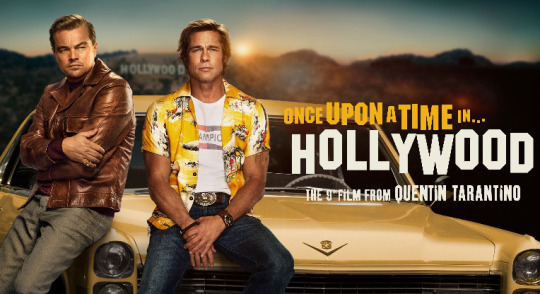
30 notes
·
View notes